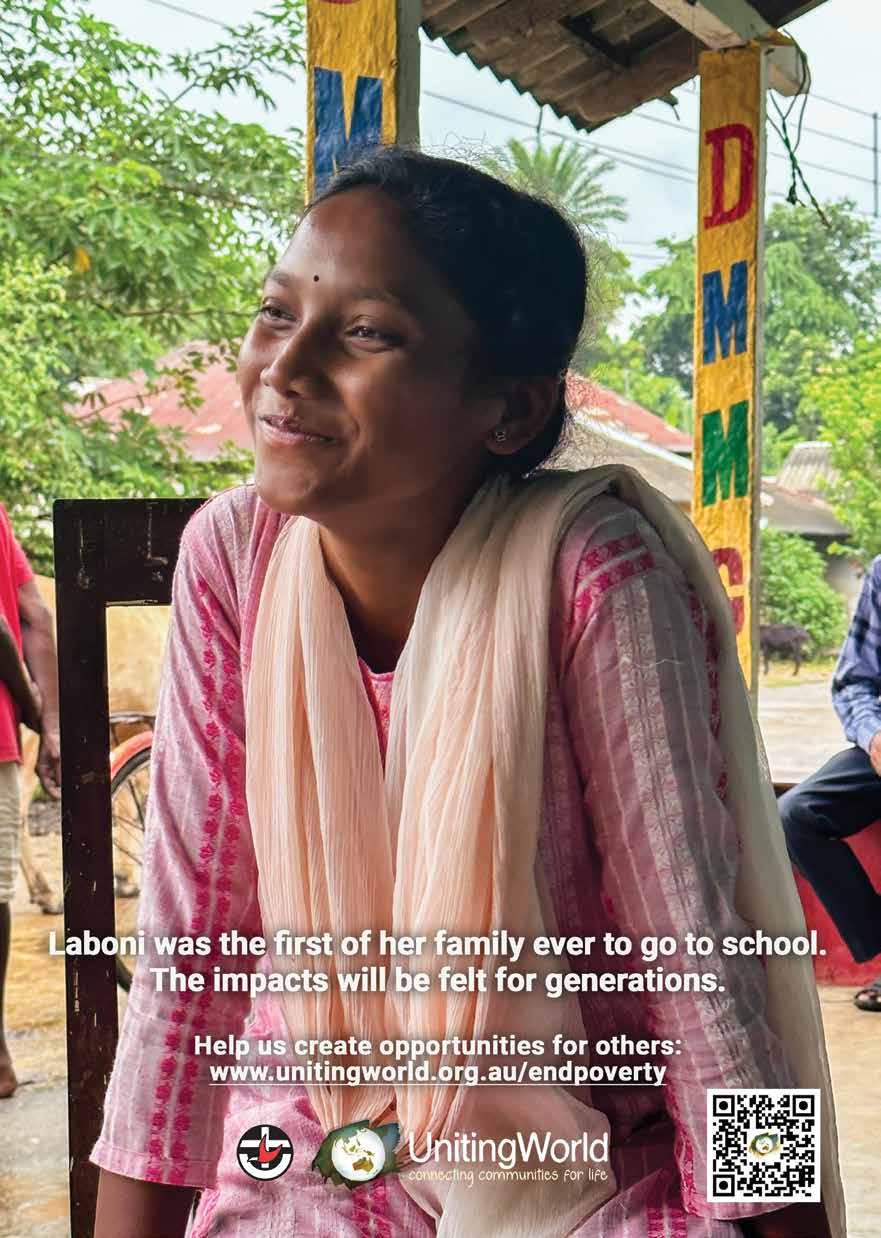PLANET VS. PLASTICS
Church Planting for Growth
THE CHURCH: Experimenting
Minority



It’s easy to get started No upfront cost No term contracts
Vennu is an easy to use platform with:
• Enquiry and booking tracking.
• Online payments.
• Money paid directly into your nominated bank account.
• Listings with photos and all the details people want to know.
• Availability calendar.
• Digital marketing campaigns and resources.
• Support available 7 days a week.
“We have increased our bookings considerably since using Vennu last year. The platform is user-friendly and their team is very supportive and helpful.“
Jessica Shaw Community + Property Manager Leichhardt Uniting ChurchVennu is a new way to promote. Turn idle capacity into revenue. Increase bookings. Engage with new customers. Enhance community connection. Bring life into previously underutilised spaces
Reduce time spent on calls and administration.


 REV. JANE FRY GENERAL SECRETARY
REV. JANE FRY GENERAL SECRETARY
THE GENERAL SECRETARY IS APPOINTED BY THE SYNOD TO PROVIDE LEADERSHIP TO THE CHURCH BY ACTIVELY ENGAGING IN STRATEGIC THINKING ABOUT THE LIFE, DIRECTION, VISION AND MISSION OF THE CHURCH.
The ‘mission’ word. Innocuous enough but capable of generating intense and paralysing confusion and disagreement. A brief Google search suggests that the word was first used in Jesuit communities in the e1590’s to describe a ‘sending abroad’ among other things. In the church, the word was used to describe God’s sending of the church into the world to proclaim – in word and deed –the gospel of Jesus Christ. At some stage in the usage of the word, it was adopted into the business world where it eventually took on an entirely different character now captured in the process and language of corporate mission ‘planning’ and related activities.
Not surprisingly, the new corporatized understanding of mission – definition, purpose and process – then found its way back to the church so that now mission statements, mission planning and the whole paraphernalia of corporate mission practices are now quite familiar, normal expectations in most UCA congregations.
knowing exactly what to expect when they were approaching their ‘long shot’ or ‘last resort’.
Their needs were various and sometimes complicated – nothing that could be simply or easily fixed with a handout, although a cup of coffee and a sandwich were usually welcome. In all of these encounters, the first thing to do was always to sit down and simply listen. This was never just the responsibility of the minister. The church was busy during the week, and I wasn’t always there. Responding to these encounters was simply a normal part of church life – a simply expression of Bill’s comment that ‘mission is as close as the person in front of you’. The work of a disciple is to respond with compassionate attention to the person or people ‘in front of you’.
I don’t know how this compassionate attention – and I’m very sure that it’s a characteristic of most congregations – could even be captured in a mission plan but it might just be the most important thing that the church does.

I’m a big fan of any process that leads to increased clarity of purpose and the responsible organisation of resources to achieve that purpose (i.e. stewardship). However, I’m much less convinced that the ‘missio Dei’ – God’s sending of the church into the world – can ever be fully described or captured in a ‘mission plan’.
Put simply, mission starts with baptism when we are claimed by God for God’s purposes.
Rev. Bill Crews was a recent guest preacher at Campbelltown Uniting Church. While I might have misremembered, Bill made a comment along the lines of ‘mission is as close as the person in front of you’. I’ve been pondering that comment ever since. I remember many occasions at Chatswood South when a stranger would arrive, sometimes on Sundays but more often during the week. Invariably, they would be nervous, unsure of themselves and a bit circumspect about church – not
Over time, patterns emerge. Noticing that the people who turned up on the doorstep most often were locals who were in the grip of a variety of mental health issues, led to the realization that mental health services had been contracting in the area over a period of time. Those services had included opportunities for recreation (art classes, book groups) and for community. Minimally, they provided a safe place for people to gather, to connect, to make friends – the withdrawal of those services had an immediate impact on the lives of those who had relied on them for companionship and community, as well as for practical help and support.
This is an obvious starting point for thinking about congregational mission – who are the people on the church’s doorstep looking for community and support? From this perspective, mission can be simply summarised as compassionate attention which leads to organised kindness and care but it still starts with the person in front of you.


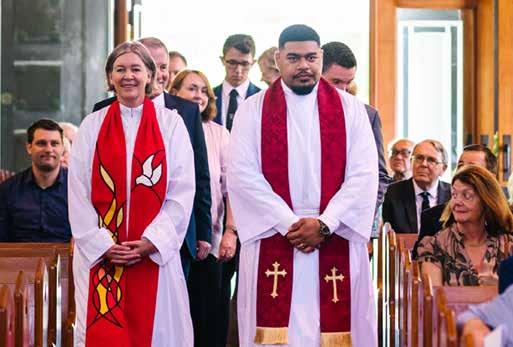


We often look around our Churches and grieve that our pews aren’t full of young people while our mission imperative is to grow and make sure that Jesus is relatable to this generation. If the first half of this year has shown me anything, it’s that our Uniting Church is full of hope and that young people are flourishing in our Church.
I saw evidence of this at Retreat Yourself in February and was encouraged by the thoughtful young adult leaders who talked about their faith and the relevance of Jesus in their lives with conviction and grace. I saw hope for the future of our Church at the 200-strong intercultural gathering of eight-totwelve-year-olds at Kids Camp Out.
resourcing and supporting ministry agents across the Synod.
instagram.com/moderator_ucanswact Follow the Moderator on instagram:
Traditional models of connecting seem less resonant with the generation of youth and young adults raised on technology. I think that when we dismiss young people as disinterested because of the myriad distractions, it overlooks a crucial truth: the future of the church hinges on our making sure we are engaging young people in a way that makes sense to them. So, it’s up to us as the church to bridge this gap and foster thriving communities as well as nurture places of belonging for young people so they can explore, question and navigate their faith.
Young people have a lot to offer. By empowering them to take on leadership roles, we can tap into their energy and creativity. Giving them the opportunity to organise events, lead worship services, or contribute to decision-making demonstrates that their voices are valued. By offering these leadership opportunities Churches are actively and genuinely in the mission of Growing Young.
Young people are passionate about making a difference in a world in conflict. Through advocacy young people can express their faith and through action they see its real-world impact. We see evidence across this Synod of the advocacy work already being supported by Churches, embracing the challenges we face as communities of faith at home and across the globe.
We are in a time and place as a Church where we need to be grappling with social issues like mental health, domestic and family violence, climate change and personal identity.
And the question about Jesus still being relevant is in itself an outdated way of thinking. We don’t what we believe, but rather present it in a way that resonates with young minds. Fresh expressions of Church, small group gatherings, and utilising technology for worship and outreach can create a more engaging experiences to explore faith and relationships.
What I do know is that young people crave authenticity. Leaders who are relatable, transparent, and acknowledge their own shortcomings and can and do establish genuine connections.
Our Synod Pulse team are fostering relationships and conversations about faith, doubts, and struggles and are creating safe spaces for young people to explore their spirituality through their camps and
Creating a vibrant youth community extends beyond our Sunday services. Events, social gatherings, and retreats foster friendships and a sense of belonging. Young people crave a space where they can connect with peers who share their values and navigate life's challenges together.
Churches should be a welcoming space for all, regardless of background, beliefs, or sexual orientation.
By adapting to changing needs, embracing technology, and fostering a community of authenticity and action, Churches can bridge the gap and inspire young leaders. The Uniting Church has a unique opportunity to offer young people a sense of purpose and belonging in a rapidly changing world.
My prayer for this Synod and indeed the whole Uniting Church is that by embracing change and fostering genuine connections, our mission to connect the Church and young people can be strengthened, ensuring a vibrant future for generations to come.

Many thanks to Ben for an excellent article about a topic many ministers would not factor into their Sunday services / messages.
I’m a retired Baptist pastor now attending a Uniting Church on the Central Coast NSW. I have felt ‘different’ all my life and never had an identity on which I could pin this difference. In the last few years, I have come to learn that I probably have ADHD. This made me understand my whole life better and many things have come to make more sense. Things like my incessant chatter, inappropriate comments, need to interrupt, and lack of concentration.
As Ben Gilmour wrote, ‘Educate yourself about neurodivergence’ and I’m not just talking to the Pastoral Staff but all people should be encouraged. Neurodivergent people aren’t trying to be rude. They just find many social occasions awkward.
In my churches, I liked to get things done in an hour and 15 minutes max. that included, with prayer / song/ message and greeting people, an offering and, often, another break or two. That’s vital. Give the neurodivergent brain time to reset. We don’t have to join in (we might) but we get a ‘time to reboot’.
Sing / Pray/ Talk may not work, not just for neurodivergent people, but others in your congregation. I often shuffled our service around. If I could cope, I thought others may get out of their ‘liturgy lethargy’. The people with the
biggest problem in ‘shuffling’ were the entrenched, not the newcomers, the neurodivergent and others.
I find the more, succinct ways of bringing the message, the better. I always knew that if you say something, a small percentage of your audience gets it. If you show something, another group does. But the most effective was to say it, to sing it, to pray it and to show it. And keep doing that.
Lastly, as Ben wrote, ‘Avoid making assumptions’. Neurodivergent people you meet may have severe troubles but they may have good jobs like I did and you might have. I think there are a few neurodivergent CEOs out there. They have a harder journey because of the way they are.
Jesus said, ‘Follow me!’ That was to all, not an elite. But, if he wanted an elite band of disciples, maybe he should have chosen a bunch of neurodivergent people (maybe the disciple were?). They understand when Jesus talks of last and first. They get Jesus’ sermon in Luke 4 - “The Spirit of the Lord is upon me, because he has anointed me to bring good news to the poor. He has sent me to proclaim release to the captives and recovery of sight to the blind, to let the oppressed go free, to proclaim the year of the Lord's favor.”
But Jesus didn’t call an elite. He called ALL people. He forgave All people. He empowered ALL people.
REV. TIM HAYMAN (RETIRED)
Retired Uniting Church Minister Rev. Mark Beaton recently restarted a support group for recently separated men to navigate their experiences.
The idea originally came to him 2022 after he counselled a man who was going through separation.
“He then told a friend who was going through the same thing, so he started seeing me as well,” Rev. Beaton said.
“Before long I was counselling five men so I thought I should get them together and see if they might be able to help each other.”
“So I formed a group and set an agenda that focused on a check-in and then from issues that I gathered from them I themed the fortnightly meetings on those issues. I then started bringing guests to share their stories (men who have had past experiences in breakup and men who had long term relationships) It seemed to be a winning formula. Unfortunately, I left the church I was using and stopped the group.”
“Iin mid 2023 I received God’s call again, so I started sending out information and made myself available to talk to men and the interest started to grow. That brings me up to this period where I am counselling a dozen men and the want for these men to gather was requested. I started a Facebook page and gave it the name “The Men’s Well” (from the previous group I ran).”
Rev. Beaton told Insights he has two main goals: To help men manage their reactions with the pain and frustration they go through in separation, divorce, and death of a partner, and to help curb domestic violence.
“There is reconciliation available for all those who have the capability to own their emotions and the group plays an important role in supporting and encouraging men to accept what’s happening today for them,” he said.
“As a minister, my hope is that they will have a spiritual intervention and want reconciliation at a divine level.”
JONATHAN FOYE


THERE IS RECONCILIATION AVAILABLE FOR ALL THOSE WHO HAVE THE CAPABILITY TO OWN THEIR EMOTIONS
The group is held at 7pm at Northern Illawarra Uniting Church. Anyone interested can, “The Men’s Well” on Facebook or email mark.beaton2@gmail.com

Cassy Eccleston is the Emerging Gen Team Leader for Georges River Presbytery, a role funded by the Synod Growth Fund. Ms Eccleston told Insights that the role is one of being a change agent.
“The role of Emerging Gen Team Leader for Georges River Presbytery is part of our Mission, Vision, and Strategic plan, and focusses on driving one of Synod’s key future direction of ‘Growing Young,’” she said.
“It is about not only training and leading a group of Emerging Gen Workers in various congregations, but also about creating and facilitating a NextGen Movement across the whole Presbytery.”
‘This is a new position, supported by Synod’s Growth Fund. In consultation with my colleagues in the Presbytery, I have shaped the role over the past year and will continue to see it evolve into the future. It involves strategic thinking in how to make the Growing Young vision come to life – identifying, encouraging and training key leaders, supporting collaboration between the congregations, and modelling possibilities.”

“There has definitely been some trial and error as I have come to learn more about the culture of the Uniting Church and this Presbytery, and above all else, it has been essential to keep God and His mission at the centre of it all.’
“My passion is to see young
people used by God for His Kingdom. I have enjoyed meeting many young people in Georges River Presbytery and seeing how God is already growing the and using them. I’m looking forward to being part of their continued journey of faith.”
WHILE
also provide alternate ways of bringing our diversity of young people together: young people who are created to be relational.”
“I am a person who loves working with teams, yet sometimes in struggling congregations we forget that we are not alone. We are the body of Christ (with our diversity and our unity), and I have loved bringing the NextGen Advocacy Team together to help set direction for GRP to Grow Young. They keep me real, and they encourage me.”
Ms Eccleston told Insights the challenging part of her role was related to change.
“Change is hard, we like what we are familiar with,” she said.
“ While the message of Jesus should never change, the way we present it to our community, and especially our young people, needs to change if we are to connect Jesus to the world we live in now,” she said.
“Young people live in a world that is run by technology, and where connection is more often than not, through a screen.”
“We need to be real about this (to take a deep breath and embrace it) and
“Our services, our ministries, our faith communities need change… but being a change agent is a challenge. I am sometimes looked at as the person with wild, crazy ideas, and as the person who can make people feel uncomfortable because I’ve facilitated change.”
Ms Eccleston said Insights’ readers could pray for her ministry, “For wisdom, energy, vision and love – may God give us all we need to reach young people in GRP and across our Synod.”
“Be bold in your context – it is easier when we are bold together.”
“Let’s be bold as we break through barriers created by traditions and safety, that we may speak into the lives of young people and grow God’s Kingdom young.”
You can follow Georges River Presbytery Next Gen on Instagram: instagram.com/grpnextgen
Kippax Uniting Church minister Rev. Dr Karyl Davison recently graduated with a DMin, which she studied through the Adelaide College of Leadership and Theology, now part of the University of Divinity.
“The question that led me into this research was, “If we (the church) really believe that Christ is somehow present and experienced in the eucharistic meal, why are we not using it in mission?”
That is, if people experience Jesus through eucharistic hospitality, it might just be the start of an exploration towards discipleship,” Rev. Dr Davison said.
“The title of my thesis is “Sacramental Sausages: Freeing the Lord’s supper for mission.” It’s research based on the fresh expression of church I led in Western Australia, the Eaton/ Millbridge Community Project (EMCP), which ran, among other things, free community events like an Easter Egg Hunt, Movies
in the Park, Christmas and a Spring Fiesta. At each event, we served food and drink.”
“My research sought to explore whether those participating in our events experienced the sacred, or specifically, the giving of food and drink as the Lord’s supper. And if so, would it be a specifically Christian privilege or open to all, regardless of baptismal status.”
Rev. Dr Davison told Insights it felt “wonderful” to have her work recognised in a public forum, yet hard to believe it was finished.
“The moment of hearing my abstract read out felt amazing,” she said.
JONATHANFOYE
Rev. Greer Hudson has moved on from her role with Uniting Mission and Education, to take up a role as Minister at Adamstown Uniting Church.
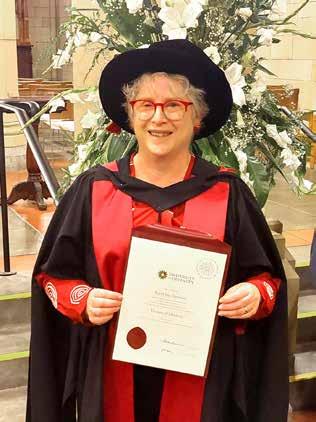

Rev. Hudson served in the role of Period of Discernment Coordinator as a part of the Vital Leadership Team, finishing up on Friday, 1 March.
Director of Vital Leadership Rev. Ben Gilmour paid tribute to Rev. Hudson’s work in the role.
“Greer’s role focused on supporting Presbyteries in their responsibilities of oversight for the Period of Discernment,” Rev. Gilmour said.
GREER HAS COMPLETED A COMPREHENSIVE AUDIT OF THE PERIOD OF DISCERNMENT
“In this past 12 months, Greer has completed a comprehensive audit of the Period of Discernment and brought a renewed vision of this program. Greer has helped articulate a distinct Period of Discernment
as a congregational resource for all to explore their gifts and their corresponding ministry. And she has brought foundational shape to a distinct Phase One program for those exploring the possibility of candidating for ordination. Greer has partnered alongside Presbytery and Synod leaders, particularly the Vital Leadership Team.”
“We wish every blessing for Greer in the future and in her ministry as she takes up a placement at Adamstown Uniting Church.”
JONATHANFOYE
Wingham Uniting Church celebrated the third anniversary of their Pacifika service on Sunday, 21 April.
The service, has members from Samoan, Tongan, Fijian, and Papua New Guinean backgrounds. It runs at Sunday evenings from 4pm, gathering on the third Sunday of every month.
Rev. Tau’alofa Anga’aelangi is Tertiary Chaplain for CSU based at Port Macquarie Uniting Church. She has been running the service as part of her role.
Rev. Anga’aelangi said the anniversary service celebrated the ongoing work of the congregation.
“It went really well,” she said. The service included a video that showcased, “where it all started.”
“It was interesting to see them react to it. It was interesting to see how people went teary.”
“It hasn’t been a perfect journey and there are times when I turn up and I have to pick people up for the service.”
According to Rev. Anga’aelangi, the service came about due to relationships she was building with migrant workers who are living in the local area.
“We had a conversation about what would you like to do,” she recalled.
“We started [by] doing a Tongan day celebration. We did a PNG independence day celebration.”
“We started a worship service. For Tongan people that was not (optional) If you set it up as a worship service they’ll have to be there.”
“You’ve got the challenges of the expectation of the local community, and I’m the one who has to balance.”
Having congregation members who are in Australia temporarily with complex needs was another challenge Rev. Anga’aelangi observed.
“They’re just here for three or four years. So what do you do with that?”
THE SERVICE CAME ABOUT DUE TO RELATIONSHIPS
SHE WAS BUILDING WITH MIGRANT WORKERS WHO ARE LIVING IN THE LOCAL AREA
“It’s been a lot of work,” Rev. Anga’aelangi said.
“You’ve got a lot of issues that come out of the new arrivals like what does welcoming mean for us?”
“How do we make sure we’re present and fully connected in our being?”
Rev. Anga’aelangi told Insights that she was still helping a lot of workers navigate work and health issues in their new country and context.
“There are so many complex issues,” she said. “You come from your country, get thrown into a big house to board with five other people.”
“Not understanding their visas, their rights, and some communication issues like access to Medicare and tax."
“There’s still a lot of work to be done to walk with them.”
“Some of them still ask me about their tax return…and Medicare.”
“All of these things come together with migration and settlement.”
Rev. Anga’aelangi observed that the service was part of what has proven to be a valuable and rewarding ministry.
“Through that service we’ve done two weddings and one baptism from this group,” she said.
“I know that some of the boys, I have close connection with them. When I go to Tonga, their families come and see me and thank me because their boys have been going to church,” she said.”
“That’s the advantage of building relationships with the families.”
Rev. Anga’aelangi said the service had, “a lot of involvement from Wingham Uniting Church.”
“They come along and bring food,” she said. That’s been a wonderful gathering for many of us.”
JONATHAN FOYEREADER COMMENT:
"This is really encouraging to hear of our Chaplaincy service to those who are new arrivals with very little underatabding of the context in Australia they will be living in and for Lofa as a person of diaspora to share her skils and experience with her Pasifika is an act of the Love of Christ in action alone even if it just means sharing a meal with them. Malo e ngaue moe mateaki e ngaue a Sisu Kalaise kihono Siasi."
ASINATE
For more information on Wingham Uniting Church, visit their official website: wingham.uca.org.au

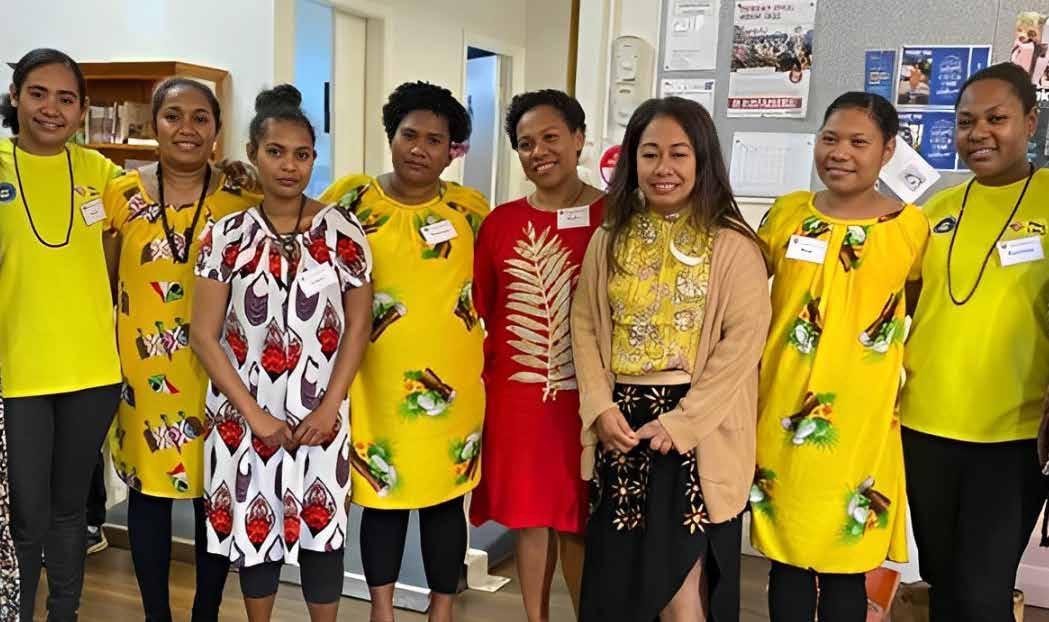
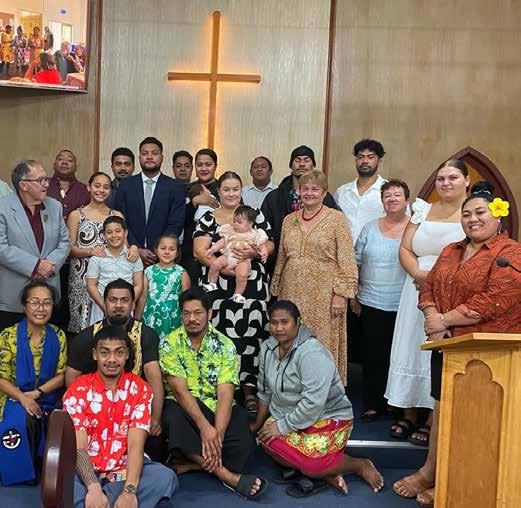

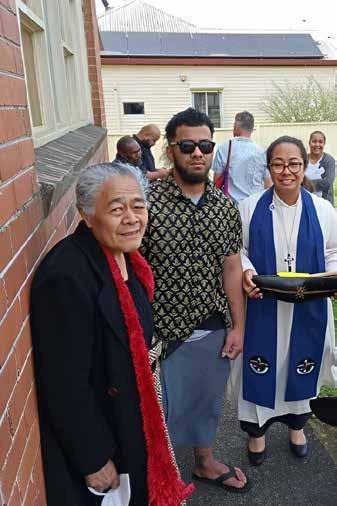

The world’s generation of electronic waste is rising five times faster than documented e-waste recycling, the UN’s fourth Global E-waste Monitor (GEM) revealed on Thursday 21 March
The 62 million tonnes of e-waste generated in 2022 would fill 1.55 million 40-tonne trucks, roughly enough trucks to form a bumper-to-bumper line encircling the equator, according to the report from ITU and UNITAR.
Meanwhile, less than one quarter (22.3 per cent) of the year’s e-waste mass was documented as having been properly collected and recycled in 2022, leaving USD 62 billion worth of recoverable natural resources unaccounted for and increasing pollution risks to communities worldwide.
According to the report, the annual generation of e-waste is rising by 2.6 million tonnes annually, on track to reach 82 million tonnes by 2030, a further 33 per cent increase from the 2022 figure.
E-waste, any discarded product with a plug or battery, is a health and environmental hazard, containing toxic additives or hazardous substances such as mercury, which can damage the human brain and coordination system. The report foresees a drop in the documented collection and recycling rate from 22.3 per cent in 2022 to 20 per cent by 2030 due to the widening
difference in recycling efforts relative to the staggering growth of e-waste generation worldwide.
Challenges contributing to the widening gap include technological progress, higher consumption, limited repair options, shorter product life cycles, society’s growing electronification, design shortcomings, and inadequate e-waste management infrastructure.
E-WASTE IS A HEALTH AND ENVIRONMENTAL HAZARD, WHICH CAN DAMAGE THE HUMAN BRAIN AND COORDINATION SYSTEM
The report underlines that if countries could bring the e-waste collection and recycling rates to 60 per cent by 2030, the benefits –including through minimising human health risks – would exceed costs by more than USD 38 billion.
It also notes that the world “remains stunningly dependent” on a few countries for rare earth elements, despite their unique properties crucial for future technologies, including renewable energy generation and e-mobility.
Nik hil Seth is the Executive Director of UNITAR.
“Amidst the hopeful embrace of solar panels and electronic equipment to combat the climate crisis and drive digital progress, the surge in e-waste requires urgent attention,” he said.
JONATHAN FOYEOur last UCAF Synod meeting was again held by Zoom and it is wonderful to be able to welcome in our Presbytery Contact people from around the State. Estelle Crabb joined us from the Far North Coast Presbytery, and we have in recent times welcomed folk from the Riverina and Broken Hill. We have sadly accepted the resignation of Margaret Rumens from the Riverina. She has been the contact person for many years. Technology can be a great tool in times like these. Unfortunately, our Joan Stott Bursary recipient, Mrs Michaela Antill-Cassie, was unable to join us but study commitments made it impossible. She will join us later this year.
We are still waiting on the latest developments and a report from the UCAF National Committee. Mrs Margaret Pedler, Past Chairperson of the UCAF National Committee, and Rev. Carmel Ieraci from Wesley Church Castle Hill will attend the South Pacific Seminar in Samoa in September on our behalf.
Our sales table has been blessed with a wonderful donation of greeting cards from Riverstone Church after they discontinued their Book Stall. The cards have already been available at the churches of our Synod Committee members.
Judith Barton the Chair of World Day of Prayer Committee reported some wonderful stories of the day’s events. In St Stephens Macquarie Street displays of craft and food from Palestine were on show and a representative from The Bible Society displayed bibles
The latest edition of our Connexion Newsletter has been distributed. Please contact Secretary Laraine Jones if you have not received one for your Congregation.
Hunter Presbytery UCAF hosted a wonderful gathering of retired Ministers and Spouses at the Retired Ministry Persons Lunch at Morisset Uniting Church at the end of April. It was a great occasion for fellowship and catch up plus recognition of Ministry service. Two present celebrated 65 years since ordination and one 68 years.


Marion St, a sacred arts project by Mikali Anagnostis and Gabi Cadenhead, has released their third EP in short succession. The EP is entitled Made, and is available on Spotify.
Gabi Cadenhead told Insights the band was excited to have the songs released.
“It’s really lovely to have these songs out in the world,” they said.
“We’ve been singing many of them at Leichhardt Uniting Church for a couple of years and it’s wonderful to share them with the wider church.”
“It was incredible to work with our musicians, most of them from LUC, to create these tracks, and our community has definitely played a part in shaping them. This EP really encapsulates who I am as a songwriter, and there’s a blurry line between my songwriting and my poetry, so it represents a lot of the ways I create. I hear every now and then about different Uniting Churches across the country singing Mikali Anagnostis’ songs from our first EP, and soon they’ll be able to sing mine too.”

when we feel broken, blesses our bodies and creates us in Their image,” Gabi said. “Each of them is intended for congregational worship, though they are framed in different ways. ‘Sabbath Song’ is about the times we feel unsure of God’s presence, a reminder to lay down our tools and refocus. ‘Salt and Light’ and ‘Fearfully and Wonderfully’ are about all of us together in community with God – how They bless us when we feel broken, how They make us in Their image, collectively. ‘Creature of God’ is a sung blessing, as if God is speaking directly to us about the sacredness of our bodies, though we can also sing it to each other.”

They added that the album’s release was thanks to funding and support from Sydney Presbytery.
“Marion St has been able to release three EPs in the space of a year, which is only possible because they committed to funding them,” they said.
“It’s wonderful they’ve seen that what we are doing as a worship collective is valuable and vital for our church and supported us to bring this project to fruition.”
JONATHAN FOYE
Made consists of four songs.
“‘Made’ features four songs about the ways God invites us to rest, calls us
“You will definitely hear a Celtic folk flavour in the arrangements of these songs, as what I listen to seeps into what I write.”
Made is now available to stream on Spotify.




Church Planting for Growth: At the 2023 Synod meeting, the Uniting Church in NSW and the ACT agreed to plant more churches as part of its plan for growth. This issue, Insights takes a look at what this means for the Synod. Church planting is not a static, fixed concept, and the church does not have a one-size-fits-all approach. Our feature for this issue reveals church planting to be dynamic, challenging, and transformational.
Transformed
Since agreeing to five new congregations at the 2023 Synod meeting, the NSW and ACT Synod has begun the work of church planting in earnest.
Rev. Dr Cameron Eccleston is the Synod’s Mission Facilitation Consultant for Uniting Mission and Education.
In September 2023, the Synod Meeting agreed to plant five new church congregations. According to Rev. Dr Eccleston, the number gave church planters a chance to succeed by learning and planting “in a cohort with others trying to do the same thing.”
“Planting five new congregations will be something new for the Uniting Church,” Rev. Dr Eccleston said.
“This will take some careful planning and discernment, and therefore consequently will take some time. We have started that process by holding an information afternoon in March, and we will continue to build momentum around this over the next 12 to 18 months.”
In planting multiple new congregations, the Synod has adopted what is often called a ‘blended ecology.’
This, he explained, involves a number of different models of church deployed at once, in different contexts.
“Our society is in a constant state of flux and consequently so is the missional landscape,” Rev. Dr Eccleston said.
“Gone are the days where we can take a “one size fits all” approach. We need an approach that is agile and adaptable to the community around us. The blended ecology approach to mission refers to a landscape where there are Parish Missions, larger, strategic congregations working alongside a network of smaller congregations, faith communities, or alternative church expressions.”
GONE ARE THE DAYS WHERE WE CAN TAKE A “ONE SIZE FITS ALL” APPROACH
“These are not in competition with one another, but rather working together to reach a broad cross-section of the community.”
“There will be some who will connect to God through larger, modern worship services, there are some who will connect through smaller, traditional services, some through deep contemplation, while others will want to connect to God through deepening Christian community around a meal. The blended ecology seeks to recognise this
shifting context and help people connect spiritually in a variety of ways.”
Rev. Dr Eccleston said people can expect the next few years to see the Uniting Church giving church planting, “a red-hot crack.”
“It is a difficult missional context we serve, and there are no guarantees,” he said.
“However, we serve a God who loves this world and wants to see lives and communities that are transformed and flourishing. We want to be a part of that, and believe we just need to surrender to God.”
However, Rev. Dr Eccleston cautioned that the process will take time.
“What you won’t see is five new congregations this year,” he said. “This will be a slow and thoughtful process as we seek to discern God’s leading.”
“From our experience, just like congregations, church planters come in all shapes and sizes and often from the most unexpected places. So, if you have ever had an inkling to church plant, even if that is part-time while still working at your chosen profession, we would love to hear from you.”
JONATHAN FOYE
Read more about the Synod 2023 Blended Ecology Proposal here: tinyurl.com/BlendedEcologyproposal
On 13 March 2024, our Uniting Church community embarked on a meaningful journey that might impact our churches and society in the future.
The "Church Planting Information and Exploration Day," organised by the Mission Team of UME in the Uniting Church Synod of NSW & ACT, was more than just a gathering. It was a heartfelt response to a divine call, an acknowledgment of our mission to spread the love, welcome, inclusion, and gospel of Jesus Christ by establishing new congregations in regions with significant population growth and opportunities for spiritual vitality. This initiative, deeply rooted in the Blended Ecology proposal adopted at the UCA Synod 2023, is both daring and visionary. It challenges us to support the creation of five new congregations across NSW and the ACT, aiming to reach out to communities with Christ's transformative love, joining Jesus in neighborhoods and suburbs where his Spirit is already at work ahead of us. Our shared vision is for five new strategic congregations in areas of significant population growth, where there is minimal current Uniting Church presence, and where our unique, vibrant Uniting Churches and agencies can contribute meaningfully.
Reflecting our Uniting Church movement's commitment, thirtyeight people, encompassing Synod and Presbytery leaders, local church Ministers, and aspiring church planters, gathered with open hearts, ready to listen, learn, and embark on a path of renewal and expansion for God's love, mercy, justice, grace, inclusion, and kingdom.
This day's essence was not merely to share information but to collectively discern God's voice in our midst. It was a day of shared vision, mutual encouragement, and spiritual pilgrimage as we sought to align ourselves with the Spirit's leading. By inviting leaders from various presbyteries, churches, fresh expressions, ministries, and those with a heart for church planting, we explored what it means to be Christ's hands and feet in communities and neighborhoods where Jesus leads us and is already present. This call to action was envisioned as a partnership—a collaborative effort that recognises the unique contributions of Synod, presbyteries, local churches, parish missions, fresh expressions, and individual believers.
Our discussions throughout the day were rich and varied, beginning with a moment of recognition and respect for the First Nations peoples and a comprehensive outline of our church planting goals. We explored the essence of collaboration, the beauty of diverse expressions of faith, and the necessity of innovative, contextual, strategic, and culturally sensitive approaches to ministry. The insights Stu Cameron from Wesley Mission shared emphasised the strength found in unity. This unity spans congregations, churches, faith communities, presbyteries, parish missions, fresh expressions, and the broader Synod. As we delved into the practical aspects of church planting, including team models, selection of locations, expectations of planters, and the timeline for action, the afternoon deepened our understanding of the resources and structures that will support this vision. An open Q&A session allowed for honest, engaging dialogue,

highlighting our UCA community's eagerness to engage in church planting and our practical challenges.
The outcomes of our gathering were profoundly encouraging. The enthusiasm and the critical, thoughtful questions posed by attendees underscored our collective dedication to making this vision a reality. The subsequent call for Expressions of Interest from Presbyteries and potential planters marked the beginning of a time of preparation for the journey ahead.
This exploration day was not merely an event but a profound declaration of our faith, a pledge to renewal and growth, a commitment to strategic church planting, and a reflection of the powerful, collaborative spirit that animates the Uniting Church. As we look to the future, we do so with aligned hearts and inspired spirits, ready to sow the seeds of new congregations, faith communities, and fresh expressions. Our shared vision is for four or five new strategic congregations in areas of significant population growth and need. In doing so, we commit to a path where faith blossoms, communities are strengthened, and Christ's message of mercy, justice, and love is fully lived out.
REV. DR GRAHAM HILL MISSION CATALYST, UNITING MISSION AND EDUCATION
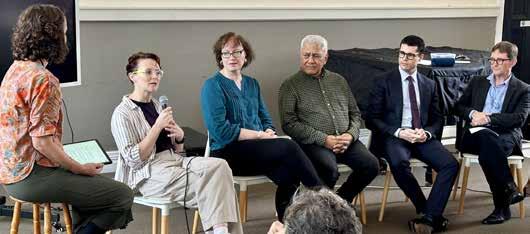
I was involved in church planting with a fellow planter for much of my twenties. During that period of my life, church planting was everything. There was no financial support from a denomination, so I worked full-time to support myself. While working full-time, I gave every spare moment and ounce of energy into planting this church in Sydney, as did my mentor and fellow planter.
By the end of that period, I was tired. I felt underprepared theologically and pastorally. I needed to get training, recharge, and retool for a lifetime of ministry and service.
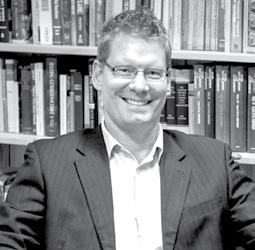
It was a good decision. My experience in church planting made the subsequent four years at theological college much richer and more meaningful. The skills and abilities I learned as a church planter helped launch me into other forms of pastoral ministry, as well as writing books and leading within Australian theological colleges.
The competencies I learned in church planting—skills in pioneering, innovation, risk-taking, and leadership—have shaped my approach to pastoral ministry and theological education, giving me the passions and competencies to start fresh expressions, launch innovations, take risks, and step out in faith and trust God even when resources are limited,
and the task seems overwhelming. Church planting shapes adventurous, visionary, pioneering spirits.
In this piece, I reflect on some lessons I learned while church planting. These are just my lessons. They’re personal. They may not even reflect the feelings of our church planting team. It’s a long list, but it’s just my attempt to wrestle with what I learned during that time.
I won’t pretend my decade of church planting compares with the experience of those who’ve done church planting longer-term.
But church planting was so demanding, challenging, exciting, painful, joyous, and all-consuming that I’ve reflected here on some lessons I learned.
Church planting isn’t about church planting.
It’s about glorifying God and our Lord Jesus Christ and joining with God in mission—and mission is about discipleship, love, gospel, shalom, the kingdom of God, and much more. My neighborhood doesn’t need another church. It needs a community of disciples who join God’s mission, commit to a distinct life together, and love their neighborhood and neighbors.
Church planting is many experiences and feelings at once.
It’s exciting and terrifying, fun and tedious, inspiring and deflating, growing and declining, relational and lonely, pioneering and shepherding, meaningful and heartbreaking, and so much more.
Church planting makes you feel like an imposter.
Deep inside, you wonder whether people will discover you’re not up to the task. You don’t have the skills, vision, training, temperament, or wisdom. And everyone is on the verge of finding this out. You’re not an imposter. So, the Spirit keeps challenging you on this insecurity. The Spirit invites you into a different sense of self and an identity rooted in Christ. The Spirit keeps whispering, “Will you let this go and trust me?”
Church planting is about praying like you’ve never prayed before.
You are so out of your depth, you have so many needs, and you’re so dependent on God that you start praying and fasting like crazy. You understand, practically and tangibly, that you are utterly reliant on God and prayer.
Church planting is about reflective engagement.
In church planting, you discover how interconnected action, community, theology, and mission are. Each deepens and relies on the other. Action and reflection go hand in hand, and those who don’t seek to make the most of that quickly get into trouble.
Church planting needs a community of disciples, a community of leaders, a community of neighbors, and a community of churches.
These three things are necessary for a church plant to thrive (and each is an interconnected community): disciples, leaders, and neighbours.
Church planting is about the dismantling of dichotomies and divisions.
Sacred/secular, evangelism/justice, pastoral/planting, etc. After a while, none of these dichotomies or divisions make sense, and you realise that if you don’t let them go, they’ll derail and disfigure the community.
Church planting makes you realise how dependent you are on others.
Want to discover how inadequate, unprepared, ill-equipped, and broken you are? Plant a church. This is why church planters need training, support, encouragement, connection with other planters, coaching, and mentoring. This support must come from established churches, other church planters, training groups, denominational bodies, and more. What do you discover you need? Advocacy, friendship, feedback, encouragement, training, finance, peer-to-peer conversations, accountability, resources, partnerships, and more.
Church planting takes a pioneering, apostolic, entrepreneurial spirit.
We often think of this as a “maverick” spirit. But it’s not. The apostolic, pioneering types in Scripture weren’t isolated mavericks. They served in a team. They joined a community of apostles, prophets, pastors, teachers, and evangelists. They welcomed accountability and obligation. And they took risks, broke new ground, pioneered new communities, and refused to be constrained by small thinking. Pioneers aren’t mavericks but are ground-breakers and crucial to the church’s future. And they often engage in social and business entrepreneurship. They usually combine church planting with bi-vocational (co-vocational) life, fundraising, launching startups and fresh expressions, charities, and other organisations.
Church planting is about learning to have open ears and eyes.
For me, it was about learning to hear and see. What is God doing and saying? Where is the Spirit leading? How is Jesus present in my neighborhood? Where are the signs of hope, inclusion, renewal, and love in my city and neighborhood? What are my neighbors doing and saying, and hoping and feeling? How can I hear and see?
Church planting needs large doses of play.
After a while, I became tired and overworked. I forgot how to play. I’ve concluded that long-term, sustainable ministry requires large doses of play. For me, that means days at the beach, going to the gym, taking up a sport or hobby, joining local community groups and clubs, walking my dog, reading novels, and going to the movies with friends. All the talk about self-care can sometimes feel a bit boring, but I’ll take play any day!
Church planting depends on imagination.
There is where beauty, art, literature, theology, creation, architecture, stories, films, and more come in. Healthy church planting requires fertile imagination. How do we create, innovate, pioneer, and find beauty and meaning without imagination?
Church planting is deeply relational.
Here’s the thing. No church plant will survive without deep friendships, healthy marriages (if you are married), intentional neighboring, and many other relationships. This is one of the most relational vocations and calls one can imagine. A ferocious commitment to relationships is critical to church planting.
Church planting shows you the power of forgiveness.
I made many mistakes, hurt people, broke promises, didn’t act with integrity, and showed terrible leadership.
But I also did many things well. I helped people, kept promises, sought God’s help, and tried hard to show the true nature of Christlike Christian leadership.
In all of this, I learned the power of forgiveness. I saw the extent of people’s grace, patience, love, and hope.
Church planting is a very personal experience and story.
Some experiences are common to all church planters, but many experiences and stories are deeply personal and unique. We all need safe spaces to tell these stories and encourage and support each other.
REV. DR GRAHAM HILL MISSION CATALYST, UNITING MISSION AND EDUCATION
This is an excerpt from his blog. The full article can be seen here: https://tinyurl.com/yyesh3c7
A FEROCIOUS COMMITMENT TO RELATIONSHIPS IS CRITICAL TO CHURCH PLANTING
 DR KATHERINE GROCOTT
DR KATHERINE GROCOTT
Often when we think of church planting, we think of mega churches, with satellite campuses and technology that streams services from one to another in the blink of an eye. Churches like Hillsong here in Australia, or Mars Hill in the United States, come to mind. We may think of independent churches setting up in school halls and theatres when we think of this missional activity. Or perhaps we might conjure up images of breakaway groups formed after some theological dispute.
Church planting in mainline denominations often goes under the radar. It might be spurred on by new housing developments, where there is no infrastructure in place for religious expression. Residents would be forced to travel if they wanted to participate in church services. Churches see the need and plan to build a Christian community in the new suburb.
different contexts, it is worth exploring what the New Testament says about church planting. Biblical underpinnings to this endeavour of church planting are important.
They might be driven by compassion or justice in some way, establishing a presence in a particular ethnic or socio-economic community. These church plants have a particular focus to reach people of a particular group or subculture. One example is Christian people moving into low socio-economic postcodes to share not only the gospel, but life, with residents experiencing intergenerational poverty.
While there are many types of church plants, and they have legitimacy in
Church planting did not start off in the New Testament as the erecting of new buildings or growing a denomination. It started as obeying the instructions of Jesus’ “Great Commission” in Matthew 28:16-20, to go into all nations to make disciples, baptise them and teach them Jesus’ way. In Acts 1:6-11, at Jesus’ ascension, he instructs his disciples to be witnesses to Jerusalem, Judea and Samaria, and to the ends of the earth in the power of the Holy Spirit.
If we understand churches to be groups of believers, then it is important to recognise that the first groups were Jewish believers. They were meeting together and being taught in synagogues. The Christian movement started as a Jewish “sect”. It wasn’t confined to Judaism, however, and
incrementally, it began to spread beyond the bounds of Jerusalem.
In Acts 2 we read of Pentecost and the conversion of around 3,000 Jews from a number of nations. The next chapter has Peter and John beginning to preach the good news at the temple in Jerusalem. By Acts 6, a large number of believers have been added, including Jewish priests. In Acts 8, after Stephen’s death due to his preaching and teaching, persecution against believers starts. Some move out of Jerusalem to escape the oppression. Philip begins to proclaim the gospel in Samaria, a region to the north of Jerusalem. Peter and John are then sent and the new believers are baptised in the Holy Spirit. Philip heads south to Gaza and converts an Ethiopian Jew who is heading home after worshipping in Jerusalem. In Acts 9 Peter and John encourage believers in Lydda and Joppa, north west of Jerusalem. Saul the persecutor becomes Paul the believer, and he begins learning and teaching in Jerusalem under Barnabas’ wing. Paul is moved to Caesarea in Samaria and then Tarsus in Cilicia to the far north, when news of plots to kill him surface.
CONTINUED ON NEXT PAGE
In Acts 10, Peter is dramatically challenged and preaches the good news to a Roman Centurion, Cornelius, and his household, family and friends, many whom believe. Gentiles are now understood to have access to, and be part of, God’s family. This foreshadows Barnabas being instructed to start a church in Antioch in Syria, where believers are first called Christians (Acts 11), and that church sending him and Paul to start churches in the surrounding regions, starting on the island of Cyprus (Acts 13).
Paul spends years travelling around the Roman Empire, sharing the good news about Jesus. From Cyprus, he visits Perga in Pamphylia, then Antioch in Pisidia, Iconium, Lystra and Derbe in Lycaonia, Perga, Attalia, Troas, Philippi in Macedonia, Thessalonica, Beroea, Athens, Corinth, Cenchrea, Ephesus, and back to Caesarea before heading home to Jerusalem. He revisited a number of the groups of believers. This was just his first two missionary journeys. One more would follow covering some of the same places and more added.
When he visited a town or city, Paul’s custom, according to Acts 17:2, was to focus on the Jews first and teach in the synagogues, often on a daily basis. If he was well received there, he would continue teaching. If not, Paul would go to the Gentiles, as his conflict with Jews in Corinth describes (Acts 18:1-6).
Sometimes he would find sanctuary in a house where he could teach from, like that of Titius, whose house was next to the Corinthian synagogue. At other times he would teach from public places like the Areopagus in Athens (Acts 17:16-34).
Throughout Acts, there is a movement from Jews to Gentiles, in terms of people groups, and from Jerusalem, to Samaria and surrounds, and then spreading into Roman provinces, in terms of geography.
Churches are planted in this missionary movement and many of the letters in the New Testament are written to those churches or individuals within them.
The groups of believers that resulted from these missionary trips, however, are still not churches as we most commonly understand churches today, with a permanent building somehow determining the members. Rather, many of them, especially amongst the Gentile believers, were house churches. Designated buildings would come much later.
Of note is the story of Lydia in Acts 16:11-40. She was most likely a Gentile polytheist, who now believed in the Jewish God, but was not a Jew. She listened to Paul teaching at a place of prayer where women gathered outside the gate of Philippi. Lydia believes what she hears and her whole household are baptised as a result. She opens her home to Paul, Silas, and the other companions and they continue to teach from there. After a brief stay in jail, where the jailer and his family believe and are baptised, Paul returns to Lydia’s house to “encourage the brothers and sisters there” before departing. This suggests that Lydia’s home had become a meeting place, a “house church”. It is arguably the first example of a Gentile house church in Acts.
We possibly see a change from the synagogue and house churches, to a different permanent building, in Acts 19. Paul has been active in mostly itinerant ministry up until that point. On this, his third missionary journey, he stops in Ephesus for two years, the longest he stays anywhere on his trips. After a few months teaching from the synagogue, tensions rise, and Paul moves to the lecture hall of Tyrannus. Here, he teaches and argues the faith on a daily basis. People from the surrounding areas, both Jew and Gentile, are able to come and hear him speak. This lecture hall, according to Andy Chambers in his book Exemplary Life, was either a building for public discussion or a school house. Owned by Tyrannus, it was rented or donated for the Ephesian church’s larger assemblies, and was combined with instruction in smaller groups meeting in multiple homes around Ephesus (Acts 20:20).
We see Paul establishing small individual house churches as well as larger assemblies of multiple households for many years. When he left a town or city, there would be local Christians assigned to lead. Paul would revisit many, encouraging, correcting and challenging. He also wrote letters of instruction and exhortation, some of which we find in the New Testament. Some are for churches, some are for leaders, others individuals. All these actions of Paul’s, are to fulfil what he believes Jesus called him to do, through Ananias, after his experience on the road to Damascus: to be “an instrument whom I have chosen to bring my name before Gentiles and kings and before the people of Israel” (Acts 9:15).
Chambers understands that there are four aspects to the purpose and character of God in Acts. Firstly, God is a purposeful God, in that the coming of Jesus and the spread of His gospel is
the fulfillment of the saving purpose of God announced by the prophets and Jesus, and proclaimed by the apostles. Second, God is a missionary God, reaching for Jews and Gentiles alike. Third, God is a saving God, offering salvation, through Jesus, to all who repent and believe in him. Finally, God is a community making God. When people are saved by God, God adds them to the community of believers. This is the church which continues to grow.
WHEN PEOPLE ARE SAVED BY GOD, GOD ADDS THEM TO THE COMMUNITY OF BELIEVERS. THIS IS THE CHURCH WHICH CONTINUES TO GROW
teachings, death, and resurrection of Jesus. It lives in the grace of God, earns the respect of its community, yet recognises that persecution will prevent some from joining. It also acknowledges and respects other believers and churches when there are differences that concern race and culture.
Chambers also argues a threefold theology of the exemplary church of Acts concerning its origin, character and mission. The origin of the church is in God. The Holy Spirit was present at creation and came upon prophets and judges to proclaim God’s ways. The Spirit anointed Jesus and later on every believer that was present at Pentecost. The Spirit continued to help those believers proclaim the Good News of Jesus and continues to do so today. God continues to build God’s church and the Spirit empowers Christians to participate in that.
The character of the exemplary church can be seen in a number of ways in Acts. It calls people to respond to the life and message of Jesus and be baptised. The church brings new believers into its worshipping life and commits to fellowship. It participates in the Lord’s Supper, prayer, meeting together, worship, and the proclamation of the Good News. The church generously shares to meet other’s needs. Believers enjoy meals together, care for the place where they live, and expect that people will be saved. The church protects its unity and boldly proclaims the life,
The mission of the church was assigned to it by Jesus when he told the disciples that they would be his witnesses in the power of the Spirit to the ends of the earth (Acts 1:8). Chambers argues that: “…the call to go and tell others about Jesus cannot be separated from the call to gather new converts into churches. The mission in Acts is about going and gathering, not just going and telling. The 120 believers who prayed and waited in the upper room…for power…became the church…before they were thrust into their mission. Everywhere the believers went proclaiming the gospel and leading people to faith in Jesus, they left churches in their wake.”
Church planting is a part of the mission of the church. It is an expression of evangelism, and is one way that God works in the world to gather more believers to the wider church. It can take a variety of forms and utilise different people and ideas. Ultimately, it is for reaching people who are not yet believers, communicating with them God’s love, grace and mercy, and offering them a community of believers to share life with as they worship God together.
DRKATHERINE GROCOTT
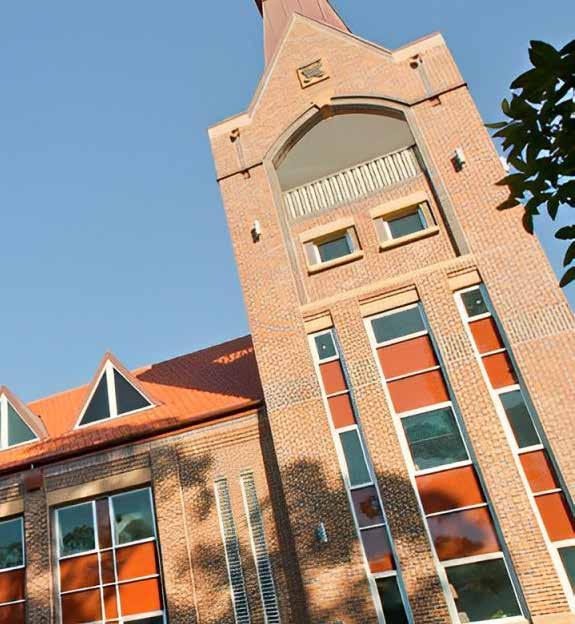


One hundred years ago, Knox Grammar School in Wahroonga, opened its gates to its first 28 students. This year our students are celebrating the School’s Christian heritage recognising the influence the Presbyterian and Uniting Churches have had on Knox.
The centenary celebrations started with a Founders’ Day Chapel Service. During the ceremony led by the chaplaincy team and Rev Stuart Bollom (Director of Mission – Schools), Knox students presented the Benefactors’ Roll and read the Founders commemorative prayer. They discussed the legacy of the chapel windows and the School’s St Giles bible blessed in Edinburgh where John Knox himself presided. Rev Dr Rosalie Clarke MacLarty reflected on the intersection of faith and education today, and the relevance of Christianity for today’s scholars.
What follows is Rev. Dr Rosalie Clarke MacLarty’s reflection:
Imagine what it was like for our schools’ founders one hundred years ago. The world looked very different; the Great War – which was the war to end all wars – was over; it was the roaring 20s and optimism was high while at the same time our First Nations brothers and sisters were experiencing discriminatory control which would have tragic consequences. Still in the spirit of colonialism, many British immigrants were arriving in Australia including those from
Scotland influenced by Presbyterianism.
As suburbs of Sydney developed, it was natural that people of faith wanted to establish schools which would educate and form their children in their faith tradition. Faith was about the transformation of lives, and education was about the transformation of lives – there was a natural and easy match. The Presbyterian faith was an expression of Christianity borne out of the Enlightenment, of new ways of thinking and understanding, and with democratic leadership. Education was about
innovation, new knowledge, and responsible citizenship – again an easy match. So, schools like Knox Grammar School were founded with vision and a pioneering spirit. They were founded in the Spirit of Jesus, and with the faithfulness that through Christ as the cornerstone, it was God’s intention to create the pre-requisites for any individual’s prosperous and fulfilled life.
Forward one hundred years to today, and the match between faith and education is not so comfortable. We want to be inclusive – so faithfulness to which religion? We wonder if adhering to a

secular worldview counts as faith? What about science and religion? How does the ‘science’ of positive psychology and the mystery of spirituality intersect?
Today many different views about education exist. Are we to be curriculum focused or to sit somewhere on the continuum towards individual child-centredness? Are our educational methods to be traditional or cutting edge, academic or technical, political or neutral about the issues of the day?
What is the place of faith in prestigious schools such as Knox now in 2024?
Naturally this is a question that our school chaplaincy team thinks about often. We know that the influence of the church is declining
in Australia. Increasingly students arrive at our school with no knowledge or cultural memory of Christianity. So how do we stay faithful to the vision of our founders and faithful to the God they served, while at the same time respond with integrity to today’s Australian context?
Thankfully we are not alone in this quandary. Our entire biblical witness – from our Hebrew origins to the letters to the early churches – are stories of faith-filled, ordinary people looking for and responding to God in their unique circumstances. Our
biblical tradition is one long recount of the redemptive experiences of a believing community. We also have the particular charisms of John Knox himself, and – since 1977 – the ethos of the Uniting Church in Australia to lean into. Both Knox and the Uniting Church are innovators while valuing traditions, are at heart nonconformists and people of conviction.
Staying faithful to the vision of our founders is to ask the question where is God in our Uniting Church school community today? Can we discern how God is moving and breathing life into our organisation and the lives we
influence? How is God calling us now to respond?
The moment we ask those questions, we humbly quieten our egos, and we put our successes and failures into perspective. We position ourselves in relation to a transcendent being.
The narrative of our founders and benefactors, the narrative that still holds this school is a Christian narrative. This gives us great social capital, as well as access to an active and living God. The Christian narrative teaches us both freedom and responsibility. Through his actions and teachings, Jesus the cornerstone of our faith, set people free and called people into responsible service.


We are set free from the obligations of proving our worth – we are all children of God saved by grace; we are set free from the crippling effects of shame – through the offer of forgiveness. We are set free from the fear of death – the promise of eternal life available to all. We are also called to love our neighbour as we love ourselves, to care for the marginalised and most vulnerable, and to keep moral commandments so that we can live best in community. This Christian message of both freedom and responsibility is powerful, and it is a powerful message to inform the purpose of our education. We want our children to be free, to be free to actively forge their own paths unencumbered


by internal and external limitations, but also to be free from self-centredness and all the woes and challenges that individualism and social inequality brings to the world. We want our young people to be responsible and genuinely community-minded, contributing to the good of all. I argue that our world needs the joint values of freedom and responsibility that Christ offers now more than ever, and I make the bold claim that our Western world has not been able to replace the Christian narrative of freedom and responsibility with any coherent worldview of substance. So perhaps faith and education are not such an uncomfortable alliance today after all?
Our Founders were free men and women and they were
responsible men and women contributing to building their community – and we all benefit from their legacies. While we will remember some of them by name today, I also want to honour those whose names we don’t know, those people who were their encouragers, mentors, and teachers. Those people who influenced them to be who they were. And going one step further I want to pay heed to all the men and women of Knox who have contributed positively to this school over a hundred years.
In ending – imagine a congregation sitting here in 2124. What will Sydney and the world be like in one hundred years’ time? How will our children’s children’s children be remembering us?
In faith, I believe the Spirit of Christ will still be active and moving in this place calling us into relationship with God and into a freedom and a responsibility –the consequences of which passes all of our understanding. And to that I say, thanks be to God. Amen.
REV. DR ROSALIE CLARKE MACLARTY
SENIOR CHAPLAIN
KNOX GRAMMAR SCHOOL

Visit the Knox Grammar School Centenary Celebrations website: www.knox.nsw.edu.au/ centenary
Have you ever travelled through the outback, or seen those vast sprawling maps, and got a sense of the incredibly vast distances out there?
The far horizons and sweeping plains are what make the outback so special, but it’s also what makes everything so much harder for those who live there.
Any help can be a long, long way away.
Elaine*’s property was a 400-km round trip from the nearest town. She didn’t mind – she’s a fiercely independent woman fully capable of running her 200,000-acre property, even after the sudden death of her husband.
But then came dementia, and Parkinson’s. The vast distances made everything so much harder.
Elaine had to leave her beloved property and the life and business she and her husband built for 40 years. The nearest aged care facility was 200km away – where she knew no-one. People in the bush bear the same burdens as all of us: illness, death, heartbreak, and despair. But they have to bear it with no one around - and hardly any support services.
How would she sell her property? How would she organise the hugely complex paperwork involved in moving into aged care? How on earth could she sort through 40 years of memories and decide which mementos to leave behind?
Thanks to the generosity of wonderful supporters, Frontier Services Bush Chaplains can travel across the outback to bring practical and pastoral care to anyone in need.
They are there for people in whatever way is required. Some need a chat and shoulder to lean on. Others need prayer and hope. Others, like Elaine, need active practical support: sorting through belongings and filling in forms to move to an aged care home.
Elaine’s Bush Chaplain was there by her side as she sold her farm, her business, her cattle, and everything she’d worked hard for. The Bush Chaplain was there to hold Elaine’s hand and drive her around as she packed up her life in the farm.
Each visit involved a 400-km round trip from Elaine’s property to the nursing home.
On an average day, a Frontier Services Bush Chaplain can travel anywhere from 20km around town to meet with emergency services teams or local elders to over 600-km round trips to teach children and engage the youth through music.
But it’s still not enough. Bush Chaplains say that they simply cannot meet the increasing need. They cannot cover enough kilometres in a day. It breaks their heart, but sometimes, they have to tell someone asking for their help, “I’m sorry, but I can’t be there for you right now.”
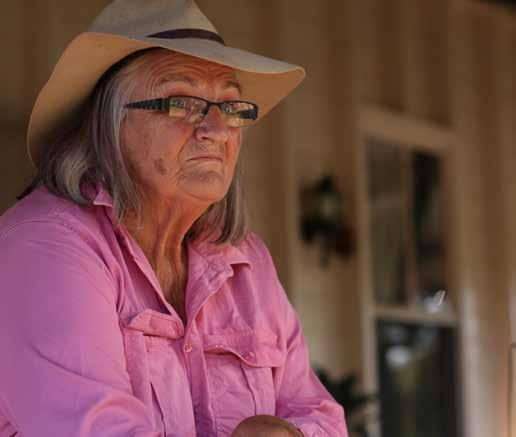
CONTINUING REV. JOHN FLYNN’S MISSION
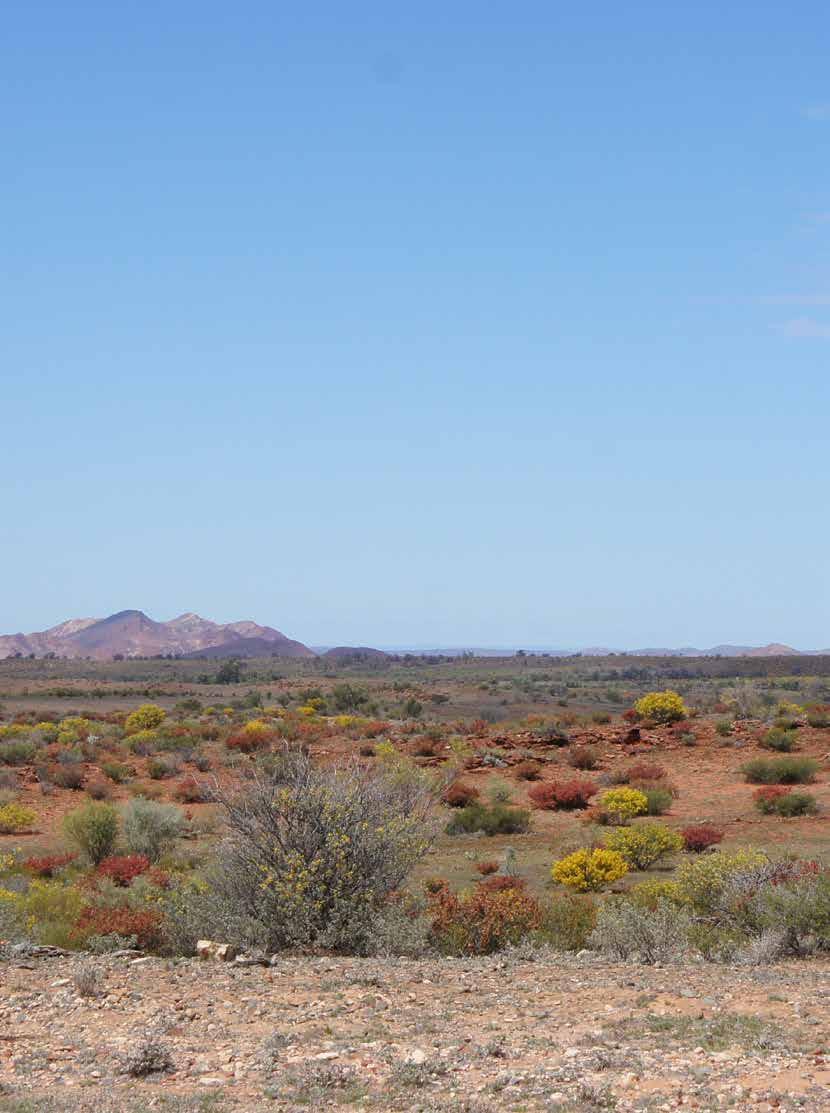
“If my Bush Chaplain wasn’t here, I think it would have all been too much, and I probably wouldn’t be here either.”
Frontier Services, formerly the Australian Inland Mission, is an agency of the Uniting Church. It is Australia’s oldest bush charity, established 112 years ago by Rev John Flynn, the man on the $20 note. Through the generosity of supporters, Frontier Services Bush Chaplains can live and travel in the bush to provide practical, pastoral, and spiritual support to people doing it tough on the land. A gift of $20 can help continue Rev. John Flynn’s legacy of providing a ‘mantle of safety’ to people living in rural and remote parts of Australia. Learn more about Frontier Services at frontierservices.org


 DR SUREKA GORINGE NATIONAL DIRECTOR UNITINGWORLD
DR SUREKA GORINGE NATIONAL DIRECTOR UNITINGWORLD
I want to share with you what I’ve learned from our international church partners about making change in the world.
The change I’m most interested in is the radical, long-term kind. The kind that sets people free after generations living in poverty and injustice, locked out of enjoying an abundant life. I know it’s possible because I’ve seen it.
I just came back from visiting projects we support in India, run by the Diocese of Durgapur of the Church of North India. What started out as a need for pencils, books and a place to go for help with homework, has grown over the years into an entire ecosystem of sustainable community development that has impacted the lives of thousands of people.
UnitingWorld, with the generous support of UCA members, has backed them for the last sixteen years. So, what did I learn? Four things.



1. CHANGE STARTS WITH A SIMPLE IDEA: A COMMITMENT FROM THE HEART IN RESPONSE TO AN INJUSTICE
For our partners in Durgapur, their commitment back in 2008 was that no child should miss out on education due to the circumstances in which they were born.
Because for too many children in their community, the situation was dire.
These children were from among the poorest and most marginalised families in India.
In the remote villages, people were surviving on informal daily wage labour, and the collection of firewood and sal leaves from a nearby forest to make plates. Most belonged to tribal groups deemed by the upper classes to be too ‘backward’ to ever fit in. Many were also from the lowest caste, the Dalits, socalled 'untouchables’.
Families that migrated to Durgapur city to find work were pushed to the fringes of society, living in the outhouses and garages of factory workers. Parents were trapped in bonded labour, with long hours of unpaid domestic work that gave them a precarious chance to live on the land, hopefully to earn enough food and keep a roof over their heads.
It meant they weren’t around when the children got home from school, and if they couldn’t work due to sickness or disability, the children would be called to work in their place.
Children would inevitably fall behind in their education or never return, keeping generations locked in a cycle of poverty and exclusion.
Seeing these huge challenges facing the rural and urban poor across their communities, our partners were moved to action.
2. CHANGE NEEDS FAITH THAT THINGS COULD ONE DAY BE DIFFERENT FROM HOW THEY ARE NOW
Our partners decided they could make the biggest impact by supporting children’s education, believing that with the right help, the children would grow up to be the future leaders their communities needed.
They created study centres to halt the high level of school dropouts and absenteeism, providing afterschool care, supplementary education and inspiring the children with realistic life goals they could achieve through hard work and dedication.
Many of the children our partners helped were the first in their families to ever access any form of formal education!
One of them was a girl named Laboni.
Laboni grew up in a typical tribal village. Her parents, like most adults in their village, had always been daily wage laborers working in the surrounding fields, piecing together a tough existence at the mercy of harsh weather and irregular crop yields.


For generations of people here, formal education never seemed as vital as the tasks of daily survival. Children grow up to help in the household or in the fields as soon as they are able; girls are married off young to make sure they don’t ‘get into trouble’ and shame their families.
This was the expected future available to Laboni, until our partners came along and helped carve out a different path.
In 2010, our partners encouraged Laboni’s parents to enroll her in primary school and offered to support the family’s journey. Laboni attended the study centre most days after school and received the homework help and additional tuition she couldn’t get at home.
Over the years, she thrived. The study centre helped her get through primary school and then go on to a girls’ high school where she discovered a passion for arts and culture.
Although many of her peers around her left school to be married as young as 17, Laboni had a different idea in mind.
Her dream was to go to university and study her traditional culture. With the support and encouragement of our partners at the study center, Laboni made it a reality.
Now 19-years-old, Laboni is pursuing a bachelor’s degree, hoping to continue into honours research, focused on preserving the rituals and traditions of her Santhali tribal culture.
She hopes to become a teacher and return to her home province, where she can help bridge the divide between traditional culture and education, and pass on the wisdom of her people to future generations. Incredible!
Laboni remains happily unmarried and credits that to the passion for education she gained from the study centre. She says she hopes to inspire other young girls in her community to prioritise their education over early marriage.
Back when they launched the study centres, our partners knew it was the start of something good. But there was always a wider vision…
CONTINUED ON NEXT PAGE



Through the daily work of the study centres, our partners came to know hundreds of families and began to understand their struggles in a number of ways.
Many people didn’t know about the government support they were entitled to, so our partners ran awareness sessions for the parents to learn how to access health care benefits, pensions, education and small business support. Many also needed help with their identity documents and paperwork to be recognised as citizens.

As the families developed a sense communal identity, our partners helped them organise to make change for their villages, running working bees to clean up rubbish, caring for the environment and lobbying their local government for services.
As the years went by, and the children grew older, the study centres started supporting the adolescents with career guidance and community education for life skills, family planning, and preventing child marriage and human trafficking.
CHILDREN ARE FILLED WITH HOPE AND WONDER ABOUT THE WORLD’S POSSIBILITIES
People wanted to improve their family income and save money, so our partners helped the women organise ‘self-help’ groups and savings clubs, and showed them how to access government microfinance grants for their projects.
People wanted land to work, so our partners installed water pumps and bore wells, transforming areas written off as “wastelands” into green, fertile farmland. Families were trained in better farming tools and techniques, as well as different ways to earn an income, raising animals or learning trades.

More years went by, and those who went to the study centre graduated university or went into business. Some have come back the village as social workers in the same project. Children who discovered sport in the study centre have won medals at district and state level.
The village where Laboni grew up is now a completely different place because of the project. Healthier, cleaner and more organised; children filled with hope and wonder about the world’s possibilities now open to them.
All of it was possible because of how embedded our partners are in the community, using the strength of their relationships and adapting their programs over the years to meet the changing needs of the people.
Our partners now run 18 study centres and a community development program working across 19 villages and two urban slum communities. They have supported 1,653 children like Laboni with high-quality education support and career skills. The wider community development work has grown to impact 1,698 households and 7,691 people with income-generation support, training in agriculture and animal husbandry, and family health interventions.
And perhaps most importantly, they built a powerful network across the region that is committed to ensuring the keys to development are held firmly in the hands of community members themselves.
4. LONG-TERM, SUSTAINABLE CHANGE NEEDS PARTNERSHIP.
The type of change I’ve been describing only happens though a network of people working together on a shared commitment, with faith and dedication to see it through for the long run.
I am absolutely convinced that this type of long-term, community-led development is the most powerful weapon we have against poverty and injustice. We in the UCA are blessed to be part of this work alongside our church partners in the Pacific, Asia and Africa. Thank you for your partnership in it. Your generous support, prayers and solidarity help create justice for generations.
DR SUREKA GORINGE NATIONAL DIRECTOR | UNITINGWORLD
Right now is an especially powerful time to give. Your tax-deductible gift before June 30 will be combined with funding from the Australian Government and make up to six times the impact to end poverty in India and



On 3 April, 2024, the Uniting Church Synod of NSW and ACT partnered with the Affinity Intercultural Foundation, a non-profit organisation dedicated to fostering friendships and cultural exchanges, to host the 11th Building Harmony Iftar Dinner. This event, which welcomed over 110 attendees, took place at the Blacktown Uniting Church and revolved around the theme of “Peace: Transforming Communities.”
“The decade-long traditional hosting of the Building Harmony Iftar dinner alongside the Uniting Church holds great significance in our hearts. As we come together in our 11th year, tonight’s theme Peace: Transforming Community highlights the essence of our gathering embodying values of peace, respect, love, human dignity, and co-existence.” said Executive Director of Affinity Intercultural Foundation, Ahmet Polat, in his welcome speech.
Moderator Rev. Faaimata and Ahmet Polat welcomed Parramatta Lord Mayor, Cr. Pierre Esber along with Member of Parliament Stephan Bali.
WE NEED TO SHOW HOW WE CAN CONTINUE THIS MESSAGE OF COMMUNAL UNITY, TO EMPHASISE THE NEED TO FOSTER PEACE AND CONNECTEDNESS
Before breaking the fast with the Iftar dinner, attendees heard grace from Rev Raymond Joso – Minister at Blacktown Uniting Church and Adhan (Islamic call to prayer) from Isa Ucar from Affinity. All guests enjoyed traditional Afghani cuisine laid at the buffet dinner table.
Raja Yassine, Islamic Philanthropy Ambassador at Australia for UNHCR (United Nations High Commissioner for Refugees), shed light on the significance of Ramadan. “I have always valued dialogue and cooperation. It is the essential ingredient in our modern world which facilitates mutual understanding and respect among people of different religions and cultural traditions. It was truly humbling to present on the meaning of Ramadan for ffinity Intercultural Foundation. The hospitality and love demonstrated by our hosts was affectionate, warm, inclusive and generous.”
Human right advocate Patricia Garcia was keynote speaker.
“We see the significance of Ramadan emphasising the importance of fostering peace starting within ourselves, with others and also the environment….I’m really pleased to be able to say that we’ve got here the communities to show that they themselves can be an example of showing how they can forge and create peace to transform communities,” she said.

“I like to say that as a humanitarian worker, peace for me is very much about bravely defending humanity. But unfortunately in these times now, we are living in a very divided world.”
“Our research is showing that situation is not going to turn around anytime soon. And I think we need now to show how we can continue this important message of communal unity, to emphasise the need to foster peace and connectedness. Ramadan is an important event of the month to mark this focus on unity, empathy and understanding to also foster peace.”
After the keynote address the evening continued with a showcase of Turkish cultural dance performance and music performance by Uniting Creative.
The Uniting Church Synod of NSW and ACT thank volunteers from Blacktown Uniting Church.
ADITEE VORA



AHMET POLAT EXECUTIVE DIRECTOR, AFFINITY INTERCULTURAL FOUNDATION GIVES A GIFT TO THE MODERATOR
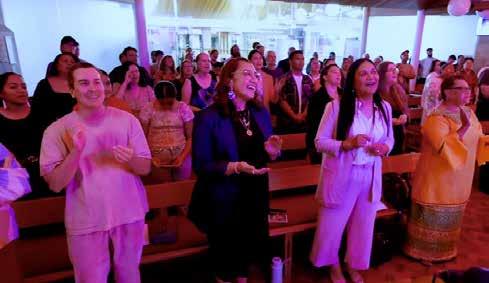

Across the inner and outer worlds of our church, creativity permeates.
During life's challenges and joys, creativity thrives, offering comfort, inspiration, and a profound connection to the divine. Standing on the threshold of everyday life, creativity serves as a refuge where individuals can wrestle with their deepest questions, explore the complexities of existence, and find meaning amidst the chaos. It is in these moments of creative expression that we often discover profound insights, glimpses of truth, and pathways to deeper understanding.
Creativity extends beyond the here and now—it bridges the gap between the old and the new, honouring tradition while embracing innovation. It cradles the wisdom of the past while daring to envision new possibilities for the future. In this dynamic dance between tradition and innovation, creativity breathes new life into ancient practices and rituals, infusing them with fresh meaning and relevance for contemporary worshippers.

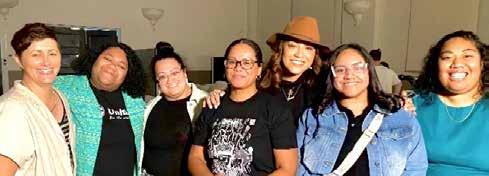
In an era where our church is earnestly striving to connect with people in genuine and captivating ways, the prophetic voice of the arts is vital. Now, more than ever, we need the transformative power of creativity to resonate authentically and deeply with individuals. Whether through music, visual art, poetry, or dance, the arts offer a sacred space for encountering the transcendent, inviting us to enter into communion with the divine in ways that transcend words.
In alignment with Future Directions, the Mission team is committed to reorganising and fostering growth within our churches. Our primary focus is on cultivating a flourishing blended ecology, which involves striking a harmonious balance between tradition and innovation. We embrace new ways of worship and ministry while honouring our rich heritage. Within this framework, Uniting Creative continues to play a pivotal role as a catalyst for creative arts within the Uniting Church. In 2024, Uniting Creative took a significant step forward by integrating with the Mission, Growth and Innovation team. Together, they will encourage exploration and the co-creation of bold new initiatives that will shape the future of the church. This collaboration aims to cultivate vibrant expressions of faith and usher in a new growth and renewal for the Uniting Church.

Uniting Creative seeks to provide valuable resources, training, and support to key leaders. Through workshops, mentoring, and networking events, we can create spaces for leaders to connect, learn from one another, and explore innovative approaches to ministry. Nurturing the formation of key leaders, not only strengthens the capacity of individual but also contributes to the overall health and vitality of the church. We aim to work closely with Presbyteries and local churches integrating leadership and formation pathways through Uniting Mission and Education (UME).
WORSHIP ARTS HAS THE POWER TO STIR OUR SOULS, INSPIRE OUR MINDS AND AWAKEN OUR SPIRITS
THE PRESENCE OF GOD
Uniting Creative's vision to establish collaborative spaces for co-creation across churches marks a significant step forward in fostering creativity and innovation. By engaging local worship artists and creative pioneers and providing an inspiring environment for creativity to flourish, Uniting Creative aims to cultivate a vibrant culture of collaboration and imagination that empowers individuals and enriches congregations.


Uniting Creative's calendar is filled with exciting events and projects designed to inspire, empower, and enrich communities. On 1 June, Uniting Creative will host its first workshop, "Enliven," where gifted creatives will gather to share pathways for Church Enlivenment through the arts. This will be followed by an Immersion retreat in September, providing an opportunity for creatives to collaborate, deepen their faith and foster meaningful relationships. Preparations are also underway for the release of Uniting Creative's second album in 2025, continuing to create uplifting, healing, and compelling music for Courageous, Contemporary, and Growing congregations.
Worship arts has the power to stir our souls, inspire our minds, and awaken our spirits to the presence of God. Through these creative expressions, we are invited into a deeper, more intimate relationship with the Divine, where each brushstroke, note, and word forms a vibrant mosaic of expression.
“There are moments in our lives, there are moments in a day, when we seem to see beyond the usual….We reach then into reality. Such are the moments of our greatest happiness. Such are the moments of our greatest wisdom. It is in the nature of all people to have these experiences; but in our time and under the conditions of our lives, it is only a rare few who are able to continue in the experience and find expression for it.”
Robert HenriLet us begin on this journey of faith and discovery, weaving the threads of our creativity in worship that reflects the beauty and depth of God's love for all.
TASH HOLMES UNITINGThe scourge of plastic on our planet and health has been well documented in recent years but despite global efforts to reduce plastic production and consumption, the industry continues to grow.
More plastic has been consumed in the past 10 years than in the entire 20th century. According to the OECD, production has grown to more than 400 million tons per year, driven by growth in emerging markets. Most of the plastic we use comes from applications with lifetimes of below five years, including packaging, consumer products and textiles. Only nine percent of plastic produced is successfully recycled, 50 percent ends up in landfill, 19 percent is incinerated and 22 percent is mismanaged, going into uncontrolled dumpsites or entering our oceans.
This not only has implications for biodiversity but also for human health, as microplastics (tiny pieces of plastic) enter our food chain and even the water we drink.
This Earth Day, on Monday 22 April, the theme Planet vs. Plastics advocates for widespread awareness on the health risk of plastics, the rapid phase out all single use plastics, a strong UN Treaty on Plastic Pollution and an end to fast fashion, most of which contains synthetic materials such as polyester which are made from fossil fuels. Earthday.org is demanding a 60 percent reduction in the production of all plastics by 2040. This would require producers and retailers of plastics to be liable for the cost of any environmental or health-related damages
in accordance with the “producer pays” principle, along with public and private sector investments in innovation to replace all fossil fuel-based plastics.
The global push for a more circular economy which encourages less waste has the potential to benefit businesses and those who invest in them.
Analysis by ISS EVA shows circular economy-related businesses are returning above their cost of capital, delivering true economic profit. Further, research by the EMF has analysed the relationship between the circular economy and investment risk and return. The analysis found that the more circular a company is, the lower its risk of defaulting on debt over both one and five-year periods.
For companies in the plastic value chain that fail to evolve, the push for a more circular economy potentially means greater risk, as companies are increasingly forced to pay for their environmental impacts in the form of taxes from governments and legal challenges. The transition, liability and reputational risks these companies face warrants serious consideration by investors.
Within the Uniting Financial Services investment portfolios, we adhere to an Ethical and ESG Investment Policy which seeks to avoid investing in companies which derive five percent or more of their revenue from harmful practices. These include damaging human health, damaging the environment and the destruction or wastage of natural resources for which viable alternatives exist.
We also invest in companies that promote positive change to the environment through their initiatives in reducing and recycling packaging waste. Companies like HP, Microsoft, and Proctor and Gamble have strong recycling operations and have ambitious goals in minimising their manufacturing waste, reducing their plastic footprint and moving towards 100%
circularity for their products and packaging.
Our Investment Policy is aligned with the Uniting Nations Sustainable Development Goals (UNSDGs), which are widely recognised as the standard for developing a better and more sustainable future for all.
In addition to excluding certain industries, our investment managers also actively engage with companies and governments on their practices.
One of our managers, AXA Investment Managers (AXA), worked with the World Wildlife Fund in 2019 to raise awareness of biodiversity loss in the report Into the Wild – Integrating Nature into Investment Strategies.
Its recommendations included the creation of a global Taskforce on Nature Related Financial Disclosures (TNFD), with the ambition of creating the conditions to
Annual production of plastics worldwide from 1950 to 2022 (in million metric tons)
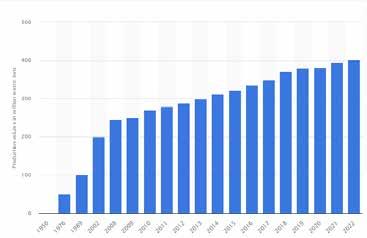

transition towards protection, restoration, and promotion of biodiversity. AXA called for an open dialogue among private and public sectors, including policymakers, with the objective of promoting crosssectorial and international engagement. AXA is a current member of the TNFD, which was formally launched in 2021.
Another of our managers, Mirova, also recently became an early adopter of the TNFD.
As part of its commitment, Mirova regularly meets with companies to encourage circular economy principles in their processes and in the design of their products.
This includes engaging in eco-design to develop
In 2015 the EU created a Circular Economy Action Plan, which identified plastics as a priority area. Today the plan is one of the main building blocks for the European Green Deal, Europe’s new agenda for sustainable growth.
The EU’s transition to a circular economy will reduce pressure on natural resources, with initiatives along the entire life cycle of products.
In February and March of 2022, the UN Environmental Assembly met in Nairobi to address every aspect of plastic pollution.
In a historic move, 175 nations voted to adopt a global treaty for plastic pollution and they agreed upon an accelerated timeline so that the treaty could be in place by as soon as this year.
The global tourism industry is notorious for contributing to the large amount of plastic waste in our environment, particularly during peak tourism seasons.
The Global Tourism Plastics Initiative ensures businesses, governments and other stakeholders do their part in reducing plastic pollution. The goal is to have concrete agreements and terms by 2025.
WE INVEST IN COMPANIES THAT PROMOTE POSITIVE CHANGE TO THE ENVIRONMENT
lightened products which require a limited number of raw materials that could be reused and recycled with a maximised lifespan; as well as using recycled materials in production and developing take-back initiatives to work with stakeholders to ensure effective recycling.
Plastic is, in many ways, a valuable resource but as a society we have developed a ‘disposable’ way of using it. Society, rather than the companies that produce plastic, has been bearing the burden of plastic pollution,
with most plastic ending up in landfill, being incinerated or leaking into our oceans. However, this is gradually changing and companies in the plastics value chain are being forced to innovate or face ongoing risks to their operating models.
While the war on plastic still has a long way to go, what is clear is that solving the issue will involve a sustained effort with close collaboration between companies, investors, and governments.


The Pulse team returned feeling encouraged from Kids Camp Out (KCO) in April where we saw 200 people from several churches and communities come together for an enriching and blessed weekend of learning and connecting intentionally for the youngest hearts of our Synod.
From across Wagga Wagga, Western Sydney, the Blue Mountains, North Shore, Central Coast and the Capital City converged on Wedderburn Christian Campsite for another year! Watch!
KCO video:
https://youtu.be/F0_F28fwHIw
KCO Slideshow:
https://youtu.be/pU1Cunpa1tU
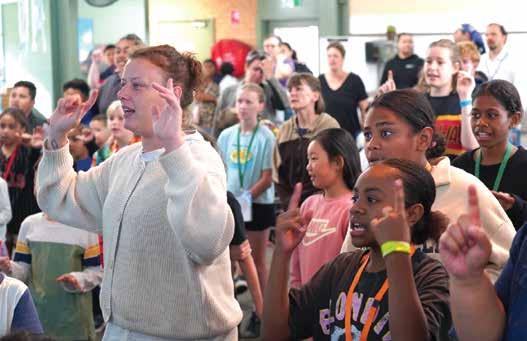
A CHURCH’S WILLINGNESS TO SEND KIDS AND TEENAGERS TO CAMPS IS A GREAT INDICATOR OF ITS INVESTMENT IN ITS FUTURE!
KCO is an annual camp for young people in year 3-6. It is a beautiful opportunity for young hearts from our Synod to gather outside of their churches and build a bigger community for the weekend.
Throughout the weekend we invite those in Highschool to be our Junior young leaders, with support and training from our youth facilitator, Ofa, they assist in leading our Children. This weekend allows whole families to participate in a truly inter-generational community. It included games, outdoor movie watching, amazing worship celebrations and opportunities for church groups to develop friendships and discipleship.
For 2024, KCO embarked with the theme of Deep Sea Diving! Deep diving into the sea and exploring about Jesus. Children explored multiple stories of Jesus from His Baptism, his parables, walking on water and ending with deep diving into Gods love for Us! It was great to be led in worship by our speaker, Leisl Holmes, by our awesome KCO band from Turramurra UC. Our Moderator and some other Church Leaders also taught us creative ways of praying for each other, led out in Holy communion and so much more throughout the weekend!
One of our Highlight at Kids Camp Out this year was a decision that the best way to tell the story of the weekend was to see it through the eyes of some of our young attenders. This looked like empowering teens with cameras and equipment to record all their favourite highlights of everything we got up to on the camp. Five young people enthusiastically rose to the challenge! They got involved with this throughout
the weekend, capturing vast amounts of highly engaging photos and video.
A Church’s willingness to send kids and teenagers to camps is a great indicator of its investment in its future! Events like this encourage young people to explore the wider church and flourish in their spiritual development as they are immersed in mountain top experiences and core-memory building to support the discipleship of their local church.
We relish the chance to send our young people to a place where we know they will be challenged to grow in God—not just entertained. With so many young people in our world feeling isolated and disconnected, and families feeling strained, we believe experiences like this bring the joy of connecting deeply and personally with their peers in a safe, Christian environment that is set apart to lead them closer to Christ.
Auburn Uniting Church has been a great advocate in getting their young people to Synod wide camps and retreats! Earlier this year they had held their annual car wash fundraiser to help fund them to get to youth and young people’s gatherings in our Synod. It was well supported by the community and they where able to raise 5K in one day! We have a send a kid to camp fund that supports churches and families financially bring young people to our camps! If you wish to donate or support a young heart to get to these events! We would love your help!
SIOSIANA (JOYCE) TANGI
CHILDREN AND FAMILY MINISTRY FACILITATOR UNITING MISSION AND EDUCATION
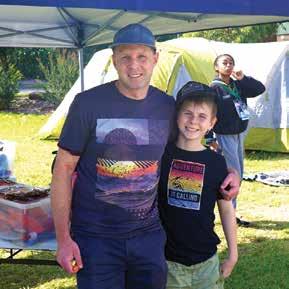


The Pulse team have launched the appeal, which has run in past years, sending children to a church camp they might otherwise not make. It continues a longer legacy dating back to the 1920s, when Methodist Church initiatives raised funds for children to attend Crusader camps.
Jo Drayton is the Pulse Team Leader. “The Send a Kid to Camp fund is a fantastic opportunity for the whole church to contribute to the discipleship of young people in our Synod,” she said.
“Pulse receives funding requests from all over NSW and the ACT, mostly from rural and regional churches who are committed to getting their kids on our camps but for who the additional cost of transporting them to and from camp and funding



leaders attendance is a stretch which sometimes puts these opportunities out of reach.”
“Every little bit counts, your donations will go entirely to sending someone to one of our 3 major camps each year, so please think about what you could contribute to help build young people’s faith and develop young leaders as part of the Pulse ministry.”
JONATHAN FOYE
Donations can be sent to the Pulse Camp Fund: BSB: 634634 | ACC: 100046230

12-13 September 2024
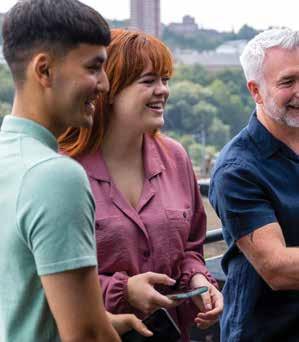

Who will benefit from SoulCare?
• Ordained church leaders
• Church and parachurch leaders
• Chaplains, counsellors, and professional pastoral care workers
• Anyone with an interest in pastoral and community care
Professional Development
Attendance certificates will be available on request for recognition of attendance at the Conference.
Discover innovative developments and practices
Understand community-based approaches
Explore existing ministries with opportunities for engagement
Get practical, with skills, tips and tools
For more information and to secure your registration go to:
www.nswact.uca.org.au/calendar/soulcare-2024-12-13-september

2 JUNE | PENTECOST 2
1 Samuel 3:1–10
With this story of the call of Samuel, we being reading a series of narratives from Samuel and Kings which will take us deep into the season “after Pentecost”. These stories provide insights into the leadership of the people of Israel in the crucial years when a key transition was taking place, moving from a group of invading tribes, consolidating into a coherent kingdom, and culminating in the reign of Solomon. In these narratives, both prophets and kings provided leadership in challenging times. Of course, these stories are not “history” as we know it today, but they are ancient tales told and retold, passed on by word of mouth and then written down, because of their enduring significance for the people of ancient Israel. This week, we hear about Samuel—a prophet whose wisdom guided the people in the early period of the monarchy. This story from the early years of Samuel’s life instructs us as we hear it in later times; like Samuel (v.10), we are to listen to God’s voice, and to respond with obedience.
9 JUNE | PENTECOST 3
1 Samuel 8:4–20; 11:14–15
Should Israel be ruled by a king? For centuries, judges had led the people, determining what was right and what was wrong. But other nations surrounding Israel were led by kings. The elders of Israel press for change; Samuel, attuned to God’s voice, rejects this request. But God pushes Samuel to accept this change; eventually, he anoints Saul as king (11:15). This is the first of a series of stories from ancient days which address a pressing contemporary issue: how to bring about effective change within the community of faith. It is something we all know about today, as society changes and the church occupies a different place in that society. How do we listen for God’s voice in this context? How do we advocate for effective change?
16 JUNE | PENTECOST 4
1 Samuel 15:34–16:13
Saul had been the first king over Israel, but his rule was fraught with difficulties. Another change is on the cards; condemned by the words of the prophet Samuel, Saul relinquishes the role. Jesse steps onto the stage; one of his eight sons will sit on the throne. It has been a bitterly-fought transition, and Samuel was saddened by the course of events. But the voice of God pushes him on, to step up and carry out his role in the transition taking place; and so the prophet faithfully anoints Saul’s successor. But which son is it to be?
Samuel had his own ideas, based on appearances; God reprimands him, telling him to focus on the heart—the very core of the being of the chosen one. Samuel exercises his prophetic discernment, selecting the youngest son, David, as king. God confirms this choice by gifting David with the spirit. Openness to new ways and new possibilities has led to this defining moment.
23 JUNE | PENTECOST 5
1 Samuel 17:32–49
The story of David and Goliath is legendary. It fits with a pattern, found throughout the mythic sagas of Israel (Genesis to Nehemiah), in which the underdog, the least expected person, plays a key role in leading God’s people. (Jesus later picked up on this motif very strongly!) As youngest child and one challenged in physical prowess, the diminutive David stands before the giant Goliath; it seems the match would be over before it began. Not so, however, as the story unfolds. Strategic cunning allows the shepherd boy to defeat the towering enemy. What model does this offer us? I am not advocating for the use of physical violence to bring about victory—but that was the way of things at that time in history (and sadly, it still is, for many, today). Why is this story told? Are there elements of this story that inform how we "live by faith" in today's world? I wonder what you think they might be?
30 JUNE | PENTECOST 6
2 Samuel 1:1, 17–27
The nature of the relationship between David and Jonathan has been the cause of renewed enquiry in recent decades. Was the love expressed by these two men for one another simply “bruvver love”, as best mates; or was it deeper and more controversial than this? Loving relationships between people of the same gender are increasingly accepted in today’s world, at least in Western societies. The “great delight” that Jonathan had for David (1 Sam 19:1) and his complete trust in him (1 Sam 20:4), leads them to form a covenant together on the basis that Jonathan loved David “as he loved his own life” (1 Sam 20:16–17). The poem in this week’s reading provides a beautiful acknowledgement of the depth and strength of this love. Even in ancient Israel, it would seem, such love was valued and accepted. It is this kind of deep love that we also can celebrate today.
7 JULY | PENTECOST 7
2 Samuel 5:1–10
Jerusalem. The name of the city evokes all manner of responses. In our own time, it has been the focal point for bitterly-contested claims about land. On a high point in the city, the sacred Jewish site of Mount Zion, sits the gleaming gold dome of a Muslim holy building. It has been contested territory for decades, ever since the modern state of Israel was established. Today, both Israeli Jews and Palestinian Muslims claim Jerusalem as the capital city of their contested territory. Ironically, the name could well mean “the city of peace” (combining two Semitic roots, yry=foundation, shlm=peace).
Even in his day, David used the site as a means to his own political ends; he takes the city from its Jebusite inhabitants and builds a foundation where God’s holiness could be reinforced and celebrated. Any imperfections of impurities— the blind, the lame—will be barred from it. The city forms a stronghold for David, as he consolidates his power in the face of local resistance. Jerusalem has always been a contested location.
14 JULY | PENTECOST 8
2 Samuel 6:1–19
MIGHT OUR OWN LEADERS BE OPEN TO THAT CLOSE RELATIONSHIP WITH GOD
The ark of the covenant had long been a focal point for people in Israel. It had travelled with them from the wilderness days, was important in the conquest of the land, and was captured for a time by the Philistines. It then seemed to have less prominence in the time of Saul, before David uses it for his purposes.
In this week’s story, David effects a change in the role played by the ark. It is brought into Jerusalem and stays grounded there; in due course, a permanent temple will be built on the site under Solomon. The death of the mere mortal Uzzah because he touched the holy ark occurs because of the holiness of the ark, as the dwelling place
of God. The ark in the city signals that God is present.
The way that David welcomed the ark into the city underlines the reverence and awe that was due towards God. A wonderful festival is held. From that time onwards, the ark remains on Zion, where the temple will become the focus of piety. Another transition is taking place, from a holy artefact that was mobile, to a fixed, permanent house for God.
21 JULY | PENTECOST 9
2 Samuel 7:1–14
A king forever. That is the promise of these well-known words, which have informed the way that followers of Jesus would talk about him. The words are given initially to David, only the second king of Israel, but the one who would provide descendants for half a millennium. The words of the prophet
Nathan are reported and remembered over those centuries as validation of the power of those kings, even though so many of them “did evil in the sight of the Lord”.
Of course, we recognise the play on words that occurs in what Nathan says. David understands God to be promising a “house” which is “a house of cedar” (v.7), but God actually intends to establish “offspring after you” (v.12) who will “establish the throne of his kingdom forever” (v.13). In the years to come, God will stand by the leaders of Israel, punishing them for their sins, but also forgiving them and loving them at each step along the way. Might our own leaders be open to that close relationship with God.
28 JULY | PENTECOST 10
2 Samuel 11:1–15
David’s adultery with Bathsheba is known and remembered through the ages. It was a shameful demonstration of sheer power, expressed through sexual violence. David’s arrangement of the murder of Uriah ought also to be known and remembered through the ages. He acted with cunning, deception, cruelty, and self-interest.
The whole sequence of events is completely unbecoming. What model of leadership is offered by this tale? The compilers of the sagas of Israel could have skimmed over this episode, allowing David to be painted in a resolutely positive light. But they included the story; and David the Adulterer and Murderer sits alongside David the Harpist and Psalmist in Jewish and Christian traditions.
He exemplifies the complexities of every human being. He is Everyperson.
4 AUGUST | PENTECOST 11
2 Samuel 11:26–12:13
The person who emerges with most integrity from the story of David’s adultery and murder is Bathsheba. In the custom of the day, she had no choice but to obey the King. She mourns for her husband. She will remain faithful to David, as king, over the years, as well as to the child she later bears to David, Solomon, who later becomes king. David, by contrast, continues his unseemly behaviour; he listens to the prophet Nathan regaling him with a tale of a rich man and a poor man and erupts in anger at the selfish acts of the rich man. Yet, as Nathan declares, he is exactly that man: privileged and well-to-do, yet fundamentally evil in what he has done. Nathan executes his prophetic role with power: he speaks forth the word of the Lord into the immediate situation, calling David to account. At least the king recognises his sin and repents. God both punishes and forgives him.
11 AUGUST | PENTECOST 12
2 Samuel 18:5–33
David’s son Absalom was, ironically, named “the father of peace”. It was claimed that he was perfectly beautiful
in appearance (2 Sam 14:25). To his credit, he avenged the rape of his sister, Tamar, by their brother Amnon, the second son of David (2 Sam 13). To his detriment, he rebelled against his father and declared himself king, forcing David to leave Jerusalem for a time (2 Sam 15). David, now a king-in-exile, plotted; eventually his forces routed the usurper (2 Sam 18). It is yet another murky period in Israel’s history. David had wanted Absalom spared, but Joab ordered him to be killed. David’s reign was secured, but his heart was broken; “would I had died instead of you”, he laments. This final verse exposes once again the complexity of David; grasping to hold on to power, grieving for his lost son. Absalom, the “father of peace” has not bequeathed any peace to his own father, David. They are both complicit in this tragic end.
18 AUGUST | PENTECOST 13
1 Kings 2:10–12, 3:3–14
David had many sons—there are 19 who are named in the Bible, and two others unnamed. We do not know how many daughters he had, except for Tamar (2 Sam 13).
SOLOMON SENSIBLY PRAYS FOR “AN UNDERSTANDING MIND TO GOVERN YOUR PEOPLE”. THAT IS THE ESSENCE OF GOOD LEADERSHIP
The passages offered this week from early in 1 Kings portray a smooth transition from David to his chosen son, Solomon; but the previous chapter has told of the plotting by Adonijah, and the next part of the story reports that David authorised the murders of his son Adonijah, his nephew Joab, and Shimei, a relative of Saul, to ensure that Solomon could reign. Living
in a democracy where leadership is determined by popular vote, this feels particularly unpleasant and unjust to us. Paradoxically, David charges Solomon to adhere to “the statutes, commandments, ordinances, and testimonies” that God has decreed. Solomon sensibly prays for “an understanding mind to govern your people”. That is the essence of good leadership.
25 AUGUST | PENTECOST 14
1 Kings 8:22–30, 41–43
The sequence of stories from the sagas of ancient Israel which we have been hearing week by week as we follow the lectionary conclude with a long prayer of dedication as the Temple is completed.
We began with Samuel; we end with Solomon. Under Solomon, Israel was said to stretch from the Euphrates to Egypt (1 Ki 4:21), the largest amount of land ruled by any of the kings (and the extent that is, controversially, claimed by extremist Zionists today).
The extended prayer that Solomon prays is equally grand; he recalls the many acts of God and the response of God’s people, and repeatedly presses God to “hear in heaven” and forgive, judge, act, and maintain their cause.
This prayer thus mediates the covenant they have made, for whilst Israel must be held to that commitment, so also God must be held to account for how God deals with God’s people. May this be our commitment, and our prayer, today.
REV. DR JOHN SQUIRES
Editor, With Love to the World.
More detailed commentaries on these passages from Hebrew Scripture are being posted for each week on his website, An Informed Faith: johntsquires.com
WHAT IS CHRISTIANITY? WHAT IS THE GOSPEL? WHAT IS THE CHURCH? CHRISTIAN PEOPLE HAVE CONSTANTLY WRESTLED WITH SUCH QUESTIONS.
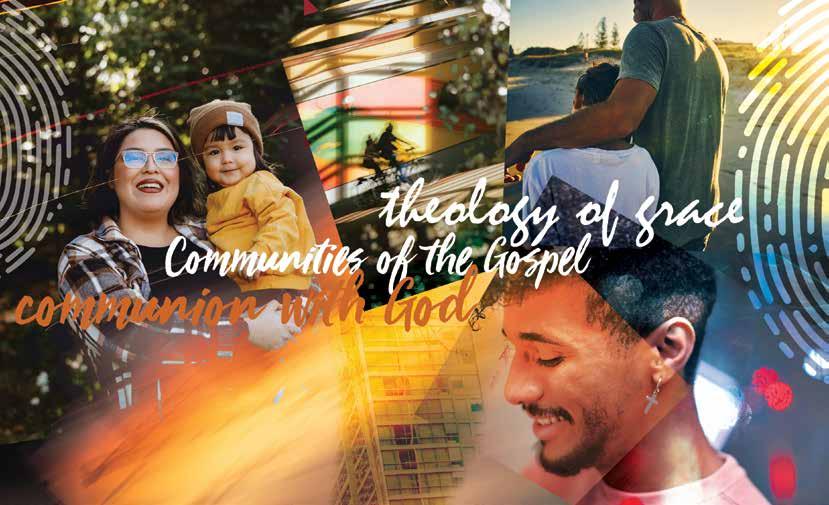
Even if they are perennial questions, they are asked with a particular edge in our current context of Christians being a minority in Australia.
Minority status, stripped of all the accrued overlays enjoyed in previous eras, can at the very least provide clarity about the centrality of Jesus Christ to Christianity and the gospel.
Christianity is, after all, about Jesus Christ: his life, death, resurrection, present and future. It’s about how, in this still unfinished drama, the one whom Jesus called ‘Abba,’ the God of
Israel, reaches out to the whole world in the power of the Spirit in reconciling, gracious, disorienting, and liberating love.
It’s about how the people caught up in and gathered around this drama –across many times and many places – have multiplied their ways of bearing witness to Jesus in their many words and many deeds.
English theologian, Mike Higton, captures this with his idea of the church as a “series of experiments in following Jesus.” In each experiment the church “unfolds something new of the gift given by God in the resurrection.”
In sum: the church “is beckoned by the Spirit into the discovery of God’s abundant gift in Jesus Christ. Its life is a collection of experiments in which the abundant love of God is explored and embodied.” In other words, the roots of such experimentation do not lie with us and our creativity or innovation. They lie with the beckoning of the Spirit. And because there is a series of experiments from which to learn, we don’t have to start from scratch every time.
Thinking of the church as a “collection” or “series” of experiments in following Jesus and responding to the Spirit’s
beckoning helps answer the question, “What is the church?”
We are not, however, used to answering this as a minority.
Some of the more recent ways of understanding ourselves have had a self-important edge. Even in the Uniting Church’s inspiring 1977 Statement to the Nation, we described ourselves as “an institution within the nation.” There are centuries (not least recent decades) of evidence to tell us that this has been a dubious experiment in self-description. We need to let it go. We don’t have to be an “institution in the nation” to exercise the prophetic ministry to which the Statement to the Nation rightly summons us.
God has often called particular churches to minority existence. Let’s embrace this and experiment with it. This also involves experimenting with how we think about the church when it is a minority. I have recently found three theologians to be especially helpful in this task. A few sketches of their ideas follow.
American Presbyterian theologian, Amy Plantinga Pauw defines the church as the “publicly visible, though not sharply definable reality of self-identified communities of Christian faith spread across time and space.”
Can we experiment with being clear about our “identity” and ensure that we are “publicly visible” whilst simultaneously resisting the urge to be “sharply definable”?
Some further comments from Professor Pauw can help us with the notion of Christian identity. She says that the church “is a trustee of a radically universal vision of creaturely communion with God.”
The church is a trustee of something particular: the odd, rough-edged story of Jesus’ life, death and resurrection as the foundation of that universal vision. The church is called to live into that particularity if it is to stay connected to its foundation.
But how, with this clear identity, do we resist the urge to be “sharply definable”?
Here, Brazilian theologian, Vítor Westhelle, can help with his idea of church as an “event” that variously takes place in “liminal spaces.” Liminal spaces are places and times of transition (personal, communal, institutional). Customary reference
points have dissolved; it is hard to get your bearings.
Westhelle insists that the church is only the church when it lets go of those bearings, and enters the liminal spaces, “the dangerous playground [where] the church has its roots.”
But he also suggests that in these spaces the church’s shape will be defined by its decisions as to whom and to what it chooses to be “adjacent.”
For Westhelle, therefore, the church needs to let itself be shaped and reshaped by the relationships it has with its neighbours.
THE CHURCH IS A TRUSTEE OF SOMETHING PARTICULAR: THE ODD, ROUGH-EDGED STORY OF JESUS’
As communities of the gospel, wherever we sit on the denominational league tables, the challenge is to explore how our local communities of Christian disciples befriend – and how we allow ourselves to be shaped by relationships with – the despairing, neglected, voiceless and the different. For the Uniting Church, arguably the ultimate test case on this issue is the extent to which we allow ourselves to be truly reshaped by our covenant with the Uniting Aboriginal and Islander Christian Congress and our claim to be a multicultural church.
If one temptation is for minorities to retreat behind their walls, another is to conform to the majority. The story of the ancient church surrendering its early cultural and social strangeness in order to conform to the prevailing social order has been told often enough.
But it is worth being reminded of just why the first Christian communities were as novel and strange as they were before the impulse to conform took hold (albeit without ever extinguishing the impulse to dissent). British New Testament scholar, John Barclay, has recently drawn attention to what he calls the “incongruity of grace” which is central to Paul’s understanding of the gospel and of the way he envisaged Christian community.
Just as God’s choice of Israel had nothing to do with Israel’s status or virtue, so it was of the first Christians. For Paul, there is an “incongruity between the mercy or grace of God and the status or worth of its recipients.” The gospel of grace creates new visions of status and worth. The lowly are lifted and the proud humbled. Social hierarchies and ethnic hostilities are challenged. The early Christian communities embodied these new visions in the nitty-gritty of their shared lives. On this it is worth quoting Barclay at length:
Paul’s theology of grace was developed in and for the creation of innovative communities that crossed previous boundaries and challenged [existing] hierarchies of worth. It required expression in social terms that could be real only if it had effect in the creation of counter-cultural practices. … [T] he communities it founded needed to demonstrate its presence in meals, meetings, and patterns of mutual care that were not bound by conventional practice.
What the grace-filled event of Christ’s life, death and resurrection did was bring forth “norm-violating communities” and generated “social identities…at a diagonal to the normal [standards] of value.”
Driven by this same grace, our communities of faith can experiment with explicitly naming our communities as “diagonal,” “norm-violating communities” in which together we learn to embody and practice this new form of society: to be diagonal in same way that God’s grace is.
This may also involve living diagonally to the popular categories of “sacred,” “spirituality” and “religion” to which the modern secularised West has relegated Christianity. Those categories can illuminate some aspects of the gospel. But through their own norms and ideologies, they can also obscure it.
In sum: our current minority status provides a fruitful context to continue the church’s series of experiments in following Jesus. It is an occasion to discover our identity without building impermeable walls. It’s an occasion to inhabit the liminal spaces of the world. It’s an occasion to live out of the incongruous grace of God.
GEOFF THOMPSON ASSOCIATE PROFESSOR, SYSTEMATIC THEOLOGYNot many scholars have written entire books devoted to John the Baptist, let alone two, but this is the task James McGrath has undertaken.
The general audience biography of John the Baptist, Christmaker: A Life of John the Baptist, will be out in the US Summer.
Dr McGrath’s other publication is a monograph digging into what we can know about John, his relationship to Jesus, Gnosticism, and Jewish history. Its title will be John of History, Baptist of Faith: The Quest for the Historical Baptizer.
Dr McGrath told Insights it was “a relief” to have the manuscripts for both books completed before the new academic year began.
“The two books are now both available for pre-order and it has been exciting for me to see the enthusiasm and eagerness to read them indicated by my online social media connections and by the Amazon ranking even this far in advance,” he said.
According to Dr McGrath, the title of his monograth plays on phrases one hears more frequently in connection with Jesus, the quest for the historical Jesus and the distinction between “the Jesus of history and the Christ of faith.”
“I worked on the bigger of the two books until quite close to the start of classes. I decided that it was time to declare it done. There would always be more that could be included, other avenues to explore, but the book had already exceeded the originally contracted number of words,” he said.
“Indeed, at one point I had thought that perhaps each chapter should be developed into a book of its own, akin to John P. Meier’s series about Jesus, A Marginal Jew. It only took a few moments of thinking about it to decide that no one would want such a series even if I produced it! At least, not yet. I hope that the impact of both books will generate not only renewed interest in John the Baptist and appreciation of his importance, but new avenues of inquiry in research about him.”
Some scholars have said that a life of John the Baptist cannot be written, that the available sources don’t provide enough information. Others have tried writing them and created works that
are heavily fictionalised. Dr McGrath, however, believed there was enough information already.
“I think that we can indeed write a historical biography of John, and that the sources we need are available to us,” he said.
“Mandaean sources are rather far removed from John in time in terms of the date when they were completed, but they can be shown to contain ancient traditions and they ought to be used critically rather than ignored.”
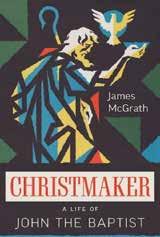

“More importantly, Jesus can be a source of knowledge about John to a greater extent than has been acknowledged in the past. Jesus never broke from him, never ceased to hold him in the highest esteem, and thus we find John’s key emphases and even his turns of phrase embedded in the Gospels and in early Christianity more broadly.”
“If we get John wrong or don’t pay him the attention he is due, we will misunderstand Jesus. Christmaker tells the story of John for a general audience, with stories from my travels in the Holy Land to places associated with him. John of History, Baptist of Faith offers detailed academic study of John the Baptist’s impact on Jesus’ use of the expression “the son of man,” Josephus’ teacher Bannus and the sign prophets that Josephus blames for fueling the fervor that led to the war against Rome, his invention of baptism, infancy traditions about him, how to utilise Mandaean sources critically, the origins of Gnosticism, and much else.
“If I’m right even about a handful of my innovative suggestions, this book will have a revolutionary impact on the study of the New Testament.”
At the time of writing, advance reader copies of the book have just started trickling out to reviewers, but Dr McGrath said that presentations based on the books’ contents have been met with positive reception.
“I hope that anyone remotely interested in Christianity, Judaism, or Gnosticism will read Christmaker and get a glimpse of my fuller portrait of John’s life, character, and teaching than others have offered before. If you are an academic then the other volume will be of interest, and I suspect that many more will at least want to take a look at parts of it.”
“The books do not overlap in content but the big monograph provides the detailed argument to support the portrait in the biography, while the biography gives me a chance to get beyond isolated details to present how I understand the big picture. I thus hope that academics won’t skip the biography and just read the monograph.”
“Each has something important to contribute. This was my first time writing two books simultaneously in this way, writing about the same topic for different audiences. In the past I’ve tended to try to accomplish both things in the same book, which wasn’t ideal. As I said, I’m really eager to hearing how people respond to this new and different way of understanding the life of the person whom Jesus described as the greatest among those born of women, i.e. the greatest human being to ever have lived. Spending more than a year focusing just on researching John, I think I now understand why Jesus said this in a way I didn’t before.”
JONATHAN FOYE


Sponsorships and Siblings discounts available.
Cost:
$370 EARLY BIRD
(1 June - 31 July 2024)

$395 FULL PRICE (1 August - 9 September 2024)
Registration close: 9 September 2024
Congregations are encouraged to donate to help send a kid to camp!


